#this dialogue was a while ago but somewhat still accurate so i kept it for the most part.
Explore tagged Tumblr posts
Text






























afterthoughts
#pokemon rejuvenation#oc bracket#mona#mona's first run#art#this has been sitting in my files since may and ive slowly chipped at it till now. my god.#im like. half happy with it. i enjoyed making it and put a lot of thought. however.#the passage of time. i loathed not finishing this sooner.#god its hard writing mona's dialogue. the main takeaway relies on how they face the After when paragon is complete. this is given that#everyone lives including Ren.#and the general unanswered question if they remain as the interceptor after xenpurgis. or if they're left to live. is the world still#dictated by Karma? who knows! i don't know shit! so their dialogue was made with that in question.#i want to give mona an eventual talking style. i have it in my head but writing it doesn't come out right.#this dialogue was a while ago but somewhat still accurate so i kept it for the most part.#a lot of internal thinking in them. thats smth huge i put down for them. rabbit heart rabbit brain#goes a mile a minute. craves the day where they don't have to worry about running. etc.#i hope to get dialogue down. someday.#anyways. i love the shenanigans i put down here.#the lost camp kids are not the same ones in canon i added new ones for funsies.#and mona's crush is not. rlly shown. but it is present. i like to think the obvious point for them crushing isn't rlly nervousness#but loosening up a lot more. especially facial expressions.#and renmona goes out on a shopping trip. i hope i added character to make mona unique... im v worried about that. enough of that though#anyways. had many breakdowns. suffered many art blocks. bon appetite.
15 notes
·
View notes
Text
Kaito Momota: How ADHD Can Be
It’s about time I properly shared a take of mine that I never really talk about in my usual analysis posts, which is my very firm headcanon that Kaito has ADHD. While this is partly thanks to me having ADHD myself, self-indulgence is far from the only thing making me think this. There are so many reasons why this makes every single bit of sense, and this post is going to talk about all of them.
And, see, I don’t want to alienate anyone by having them think I’m about to present an interpretation of Kaito that looks nothing like the Kaito we know, because that’s not it at all. I’m here to talk about how so many of the things that were already abundantly true about him also happen to fit perfectly with ADHD. Really, you could think of it more as me talking about how ADHD actually looks a lot more like Kaito than most people might have realised.
After all, ADHD is a frustratingly misrepresented disorder that’s way more complex and interesting than most people are aware. So not only does it make a huge amount of sense to see Kaito as ADHD, it’s also just genuinely fascinating to think that this could be influencing how his mind works and the way he reacts to things throughout the story. Imagining that Kaito has ADHD could never make him any less Kaito, but I do think it makes him yet another layer of interesting on top of everything else he already has going on.
So even if you don’t have any personal investment in ADHD yourself, I hope you can follow along with me for this. There’s a lot of fun stuff to talk about here.
(Since ADHD is so horribly misrepresented that I can’t expect the average person to know what it really involves, this post is also going to include something of a whirlwind explanation of ADHD itself, in order to help people better appreciate why all these things about Kaito are potentially ADHD things. With that said, obvious disclaimer: I am not remotely a mental health professional, just someone with self-diagnosed ADHD who’s read up a lot about it. Some of this will be from things I’ve read, and some of this will be from my own experiences that I’m now pretty sure are an ADHD thing. My descriptions of these symptoms are likely to be somewhat oversimplified because I’m focusing on explaining this headcanon rather than explaining ADHD itself, so please don’t take this as a definitely-100%-accurate ADHD resource. I’m happy if this can raise awareness of what ADHD is really like, but you should look elsewhere to learn more.)
Hyperfixations
One major thing that ought to be more commonly known about ADHD is that it’s really not a lack of attention; it’s an inability to properly control where our attention goes. It’s been described as an “interest-based nervous system” – we’ll involuntarily focus on whatever seems most interesting to us in any given moment, regardless of its objective importance.
This plus a reduced amount of dopamine receptors means that when we manage to find something that gives us a lot of dopamine, ie, is fun and engaging to think about, we cannot stop thinking about it even if we wanted to. Our entire lives will begin to revolve around this Thing that we enjoy, thinking about it, doing things related to it and consuming more information on it to get as much of that sweet dopamine as possible. This can often be to the detriment of everything else, including more objectively important matters, because who cares about that stuff when Thing is the best thing ever!?
As an example: as you might imagine, I have been hyperfixated on DRV3 and especially on Kaito for over two years now. I have not been able to stop thinking about Kaito even when I’m supposed to be doing other things, and there’s literally nothing that’s more fun for me right now than sharing all these thoughts of mine with other people. We also love to infodump about our hyperfixations to anyone who’ll listen, after all. That’s precisely why this post exists, along with many more like it on both my blogs.
SPACE
So, this is perhaps one of the most easy-to-spot signs that Kaito might be ADHD. Because, man, he really loves space. Sure, any astronaut would have at least some level of interest in it, but Kaito is so obsessed with space that he introduces himself with a grandiose space-themed title, wears a galaxy print on his slippers and the inside of his jacket, and simply couldn’t wait for a college degree and had to make sure he got up there as fast as possible.
Granted, it’s not like Kaito talks about space 100% of the time. He is stuck in a killing game, after all, which is also kind of important to pay attention to. But, still, no matter what more-objectively-important things they can push themselves to focus on when necessary, there’s always a part of an ADHDer’s brain that’s near-constantly thinking about their hyperfixation anyway and will take any opportunity to bring it up and make things about that if they possibly can. And, well, Kaito still talks about space quite a lot considering that he’s in a life-or-death situation that doesn’t have anything to do with space at all (at least, as far as he knows for most of the story).
There’s one delightful bit of white noise I absolutely love in a debate in trial 4 where Gonta is suggesting a vehicle could have crossed the river. Someone responds to this with “Like a rocket?”, despite the fact that, A, there were obviously none of those in the Virtual World, and B, you don’t use those to cross rivers. Kaito, you dork, now is not the time. But of course now’s the time, there is always time to be thinking about space-related things, no matter how impractical and irrelevant it might be. Someone has been murdered, everyone else’s lives are on the line – not to mention his illness and the huge pile of inferiority issues he’s struggling with at this point in the story – yet amongst all that, Kaito’s brain still found time to go, “hey, speaking of vehicles, aren’t rockets the coolest!?” And… yeah, that’s genuinely what hyperfixations are like.
Then there’s the time Kaito asked Maki what her favourite spaceship was, like this is just an obvious go-to conversation starter in his mind, because of course he has a favourite spaceship. He has thought a lot about his favourite spaceship (or spaceships; let’s be real, there’s probably several that he thinks are SO COOL and might call his favourite depending on the circumstances) and could fill ages talking about nothing but that. Even though he knows this conversation ought to be making its way towards helping Maki open up about her past – this is one of his training sessions, after all! – there is still a part of Kaito that really just wants to talk about space, because a part of him always wants to talk about space.
We can see this as well in multiple FTE invitation dialogues (those brief lines describing how they hung out before the actual event starts) in which Kaito apparently spends it talking to Kaede or Shuichi about space, just because he can. There’s also several of his hangouts in the Salmon Team bonus mode where Shuichi’s suggestion of what to do doesn’t really have anything to do with space, but Kaito finds a way to make it about space anyway. ADHD minds are hyper-associative and make connections between concepts very easily – and, naturally, they’re particularly liable to make connections to the thing that the mind is already spending the majority of its time thinking about. So it’s really not so surprising or remarkable at all that Kaito can find ways to make even seemingly-totally-unrelated topics about space somehow, not if he’s ADHD.
(…To be fair, a particular fixation on a certain topic to the point of repeatedly bringing it up when it’s not called for isn’t necessarily that uncommon among Danganronpa characters, what with their talents. But hey, that doesn’t have to make Kaito any less likely to be ADHD. Rather, it would actually make sense for Ultimate students to have a higher than average proportion of ADHDers among them, since an ADHD-fuelled level of intense interest in a thing is more likely to make someone become hugely talented at it out of accumulated knowledge and practice. I’ve been increasingly thinking that Kaede could perhaps be ADHD, too, for example. But that’s not for this post; we’re talking about Kaito here.)
The longevity of space
ADHDers will generally go through many different hyperfixations throughout their life, sometimes one at a time, sometimes somehow managing to juggle more than one. An individual hyperfixation tends to last anywhere between a few weeks to a few years depending on its intensity and the longevity of the topic, but it’s rare for it to be more than that. Usually, sooner or later, the overwhelming passion for the thing will wear itself out.
And admittedly, Kaito’s passion for space has been there since he was a kid and never faded – and never will, of course! – which is far more persistent than most hyperfixations tend to be. But then again, there’s so many different things related to space for him to get excited about! Hyperfixations fade either when something else comes along that’s more exciting because it’s new and fresh, or when you’ve squeezed every last possible drop of dopamine out of it such that it no longer holds quite the same thrill. But with a topic as vast as space, there’s always more to learn to keep the excitement fresh, especially now that Kaito’s an astronaut trainee and is really on the front line of new space knowledge and technologies and is actually going to get there himself one day!
Besides, it’s not like ADHDers’ hyperfixations are completely outside of their control. My own hyperfixation on V3 and Kaito would probably have faded ages ago if I hadn’t kept it going by constantly making more content about it such as this. And similarly, there’s no way Kaito would have wanted to let go of his passion for space, not if he had any say in it himself, so he’d have done whatever he could to keep it burning during the times when the spark maybe wasn’t quite there as much. I don’t think it’s at all unreasonable that Kaito could have remained hyperfixated on space for so unusually long and still be showing no signs of stopping. We all know how stubborn he is.
(House plants)
Kaito has probably had a few other, lesser hyperfixations alongside his lifelong passion for space. For example, I like to think that his fondness for house plants, according to his report card, is to such an extent that he was once hyperfixated on them. (This would have been for reasons that totally don’t bear a suspicious resemblance to other things he cares about.) I doubt he’s currently hyperfixating on them at the moment – at no point does he ever try to shift the conversation to being about house plants unprompted – but that wouldn’t stop him from still being generally fond of them and retaining all of the “useless” information he learned about them back when he was obsessed. One very rarely ever stops caring about a hyperfixation topic entirely; rather, the fixation just fades and the topic becomes no longer constantly on someone’s mind. I’m sure Kaito still could and would talk your ear off about house plants just as much as he would about space if you happened to get him started.
People
More importantly, though, I think that another of Kaito’s less obvious and intense hyperfixations – but still a very long-lasting one that’s active right now – could be, simply, people. Just, people in general: their flaws and complexities and differences, all the many ways in which they can communicate and work together, and the amazing potential they have to achieve great things if they do so. Kaito is so passionate about this stuff and has so many fully-formed opinions on things of this nature that make it seem like he’s spent a lot of his free time thinking about this, just because he can. Maybe he began to get interested in it after realising that communication and teamwork is important for an astronaut – but it also reads to me like Kaito is into this kind of stuff not because he needs to be for the sake of getting into space, but simply because he finds it genuinely fascinating and couldn’t stop thinking about it even if he had to. (Which would also help keep him interested in space, because it’s intrinsically linked to this other topic that Kaito finds fascinating!)
And within this, Kaito definitely hyperfixates in particular on his sidekicks. Once he’s made someone into his sidekick, which functionally means that he’s going to devote himself to supporting them through their issues and helping them reach their potential, he really devotes himself. It’s his hyperfixation on people in general, but concentrated on a specific person(s) that he can have a direct and tangible impact on, which means even more to him than just his feelings about how awesome and fascinating humanity is as a whole.
Kaito is really, really good at supporting his sidekicks, after all. He spends so much time, even when he’s not around them, thinking about what their problems are and the best ways he can help them. He was clearly eyeing up both Shuichi and Maki as potential sidekicks at least a day or two before actually acting on it and inviting them to training, as if he was trying to gauge exactly what their struggles were and how best to help before jumping right in. He approaches helping each of them in very different ways, making it clear that he’s specifically thought about who they are and the best tactics to help them individually instead of just carelessly using the same old script each time. On more than one occasion, he drops something on them one morning – the nickname “Maki Roll”, and the “bonus” training that becomes the katana scene – that he hadn’t mentioned at all the previous night, meaning that he’d been thinking further about how to keep helping them while on his own overnight.
So it seems to me like maybe it’s not just his selflessness, or his somewhat unhealthy co-dependency (more on that later, actually) that makes Kaito so good at this. I don’t think he could even stop thinking about helping his sidekicks if he tried. Figuring out how to help another human being grow and change and reach their full potential is so fascinating and engaging and rewarding to him that how could he ever not be compelled to do that as much as he possibly can?
The price of caring
This does, however, come with a downside. Because Kaito is fixating so strongly and uncontrollably on supporting his sidekicks, because doing that matters so much to him, it’s only going to hurt him more when he begins to feel like he’s failing at it. He can’t just brush something like that off as not really a big deal, because of course it’s a big deal. It’s everything to him, and it’s literally not possible for him to make himself feel like it isn’t.
It’s just as bad as if space suddenly twisted and became painful to think about somehow. Which… I guess that actually kind of happens too, when Kaito starts to realise that he’s never going to make it up there. And he can’t deal with that by trying to tell himself it was never that important, either, because space is always important to him. Even if he wanted to switch that part of his brain off or ignore it to help himself cope, he just couldn’t.
Caring so intensely about things feels amazing and makes a person wonderfully passionate, but it can also be a double-edged sword.
(Executive dysfunction?)
One big negative side to ADHD is that it tends to cause executive dysfunction, which, to massively oversimplify it, more or less means the profound inability to get yourself to do things that you know you’re supposed to be perfectly able to do. That interest-based nervous system does not do well with motivating us to do tasks that are objectively important but aren’t interesting or fun to actually carry out, resulting in a mental block that can appear to the outside observer like wilful laziness, even though it really, really isn’t.
This appears to be one part of ADHD that Kaito manages to avoid having to deal with. (He may superficially seem “lazy” during training, but that has nothing to do with his brain and everything to do with his body and the fact that he’s sick and doesn’t want anyone to know.) But I think that’s mostly because none of the reasons that ADHD causes executive dysfunction actually apply in the killing game.
One of the few things other than interest that motivates an ADHD brain is urgency – suddenly they can do that boring essay they’ve been putting off when the deadline is tonight, showing remarkable speed and focus in a fit of nervous anxiety over the potential consequences of turning it in late. And there’s plenty of literal do-or-die urgency to motivate Kaito during the killing game, so there’s no way he’d ever not be motivated to do what he feels he needs to do to help everyone there. Plus, the things he’s trying to do involve helping people, something he inherently finds interesting, so he’d be motivated for those reasons anyway even if it wasn’t quite so life-threateningly vital that he does so.
(Kaito is a bit flakier and liable to miss important details during the investigations and trials, mind you. This might be because, while the urgency of “if we don’t solve the case we die” is looming over him, the actual details of the case aren’t something that instinctively feels urgent or that he inherently finds interesting, so it’s harder for him to pay proper attention and take it all in even when he’s trying to. Kaito has plenty of intelligence in a lot of ways, but his brain is evidently not wired for investigations and deductions like Shuichi’s is – he’s perfectly capable of following Shuichi’s logic and understanding it, but not of figuring any of that stuff out himself in the first place. This could partly be down to Kaito having ADHD and just not being interested enough in these particular kinds of mental exercises to be able to get his brain to focus on them as much as he’d need to in order to solve them.)
I also don’t think executive dysfunction would have got in Kaito’s way much during his regular life before the killing game. (You know, if he’d actually had one, but let’s pretend for now that he did.) Motivation issues can be helped a lot by an externally-imposed structure telling you what you need to do and when, which is why a lot of ADHD people don’t even notice any problems while they’re in a school system and only fall apart once they’re adults and are suddenly expected to structure their own life. Kaito’s astronaut training would definitely give him plenty of structure to work from so that he always knew what he needed to do and never had this issue. It’s also really challenging, which is another thing that helps keep ADHD people interested and motivated. And while the actual end goal of getting to space is far-off enough that it wouldn’t be able to work as a direct motivator to an ADHD brain (we are bad at things with delayed gratification), everything Kaito’s learning would still be related to space and communication and teamwork, so he’d be interested in learning all of it simply for its own sake.
Emotional hyperarousal
Another big defining feature of ADHD that isn’t nearly as well-known as it ought to be is that it amplifies emotions to a far greater intensity than those of neurotypical people. ADHDers’ feelings and reactions are naturally bigger and louder and just more than most people’s – which sounds a lot like Kaito, doesn’t it? He’s always larger than life, energetic and passionate about everything, not just his specific hyperfixations. Look at how excited he gets about just seeing snow! And he has so much enthusiasm for so much else, too – as he puts it: “there’s nothing unnecessary in this world!” When Kaito feels things, he feels them full-throttle, with no half-measures, which is just how Kaito would always want things to be!
…But, whether he likes it or not, that also applies to the painful feelings just as much as the good ones.
Emotional dysregulation
Kaito can often be very reactionary and get unnecessarily riled up over minor things that don’t really warrant such a dramatic response. If you think about it, this isn’t really something he’d want to do, because he’s always trying to stay positive and keep people on his side. So apparently it’s something he simply can’t help, as if his brain is just wired to make him more liable to do that.
If even minor slights can cause an overreaction like that from an ADHD brain, then imagine how much worse it is when the stimulus is something genuinely worth being upset over. That already-painful emotion gets amplified to even greater levels, to the point that it can be almost unbearable. People with ADHD can often have a more difficult time dealing with things, not necessarily because they’re emotionally weaker, but because they simply feel things harder than most other people do.
Kaito goes through a lot of emotional pain throughout the story – and he’s really pretty bad at dealing with it all. He basically has only two not-very-healthy methods for doing so. One is to try to ignore it entirely by focusing on something more positive, which on its own could be put down to his desire to come across as an invincible hero who can inspire people. So this particular unhealthy tactic doesn’t necessarily mean that he wouldn’t be able to properly deal with these emotions if he actually stopped being an idiot and tried to.
However, Kaito’s second unhealthy coping mechanism is to turn the pain into anger – sometimes to the point of lashing out in ways he doesn’t mean to. Punching Shuichi at the end of the first trial is very much caused by Kaito being unable to contain his pain over Kaede’s death rather than any controlled attempt to push Shuichi forward, since he regrets it and apologises for it the next morning. And then the agonising truth that Gonta killed someone is even harder for Kaito to bear, leading to him lashing out at Shuichi again in what was very much desperate pain-fuelled anger with no rational basis for it. Unlike with simply hiding his pain, lashing out like this is not something Kaito would ever want to do; it’s not exactly very heroic of him, after all. So this suggests that there’s more to Kaito’s bad coping mechanisms than just him trying to appear strong and not worry people – that sometimes the pain gets so unbearably intense that ignoring it isn’t possible and he just can’t deal with it and loses control of himself.
Uncontrollable bouts of rage can be a common problem that comes with ADHD because of the amplified emotions and difficulty properly regulating them – and it’s definitely a problem Kaito suffers from, too. That part of Kaito that lets him get so wonderfully passionate in helping everyone around him might well be exactly the same part of him that simply cannot handle it when he realises Gonta murdered someone and leads to him lashing out at his best friend.
Moping (…not a technical term)
…Okay, I just said Kaito has only two unhealthy coping mechanisms for painful emotions, but maybe there’s also kind of a third: unconstructively moping about it. This doesn’t sound like Kaito at all – he frequently gives others advice about not doing exactly that – but he can actually be seen falling into doing so a couple of times if you look closely.
In chapter 2, when Ryoma’s behaviour bothers him for all the wrong reasons and he has no intent of actually doing something about it, Kaito really should be just trying not to think about it at all and focusing on something more constructive like helping Shuichi. However, the places he hangs out in for his chapter 2 FTEs and his invitation dialogues indicate that he spends a whole three FTE slots just brooding unhelpfully about the state Ryoma’s in. This is definitely not something he wants to be doing, since he hastily changes the subject if Shuichi hangs out with him.
And in case 4’s investigation, after Shuichi’s cell phone experiment makes Kaito feel useless and unneeded (he thought Shuichi needed his help! – but, no, turns out he actually really didn’t), the pain of that feeling noticeably lingers with him for most of the rest of the investigation. He’s in enough of a bad mood about it afterwards that Maki notices it through his less-expressive virtual avatar, and he doesn’t even come with her to call Shuichi back from the rooftop and just logs out on his own in a sulk. Then he also ends up explicitly unaware in the trial of some of the information Monotaro shared with the whole group once they’d logged out, meaning he was apparently still too wrapped up in feeling useless to be paying proper attention.
(And these are the two examples of Kaito doing this that are noticeable thanks to subtle clues in his behaviour – but since Kaito would obviously never draw attention to it, maybe he actually does this a lot more than those two times and we just can’t normally see it.)
See, another thing about emotional dysregulation – plus the difficulty in controlling the focus of your attention that comes with ADHD – is that it can be hard to stop yourself from thinking endlessly about painful things, even when you very much don’t want to be thinking about them. I once saw a tumblr post describing ADHD as Chronic Cannot Leave It Alone Disorder, and I can confirm that, yes, this is very frustratingly accurate, for the bad things as well as the good. It’s possible that Kaito’s advice about not moping when you could be doing something to make a difference might have originated for himself, to try and mitigate his brain’s tendency to do this. But while I imagine this helped quite a bit in letting him control his thoughts and stay focused on the positives, it appears that, despite his best efforts, it still doesn’t always work.
Impulsiveness
The Primarily-Hyperactive subtype of ADHD (aka the one that’s definitely the subtype Kaito has, for obvious reasons) is sometimes called Hyperactive-Impulsive type, because impulsiveness tends to be a big part of it, too. I think this is kind of a combination of emotional hyperarousal and inability to control attention – the impulse to Do A Thing gets amplified to the point that it floods the entire brain, and it becomes nigh-impossible to ignore it and consider the potential negative consequences before acting on it. It’s like that Chronic Cannot Leave It Alone Disorder gets concentrated into a single instant of frequently-terrible decision-making.
It’s no secret that Kaito is impulsively reckless – and if you think about it, it’s to an extent that’s honestly kind of pathological. Cheating his way into the astronaut exam early, for example, could very well have permanently ruined his chances of ever being allowed in and making it to space. He should never have considered that a risk worth taking. So apparently he just wasn’t properly considering the risk at all – not even for the most important decision of his life.
A lot of the time, these kinds of bad decisions can be fuelled by those amplified painful emotions that get turned into anger like I talked about before. The stress of the killing game causes Kaito to very nearly get himself killed on two occasions early in chapter 1, almost lashing out in a way that would have broken school regulations. Kaito is perfectly aware of the consequences for doing that – but in the heat of the moment, it just doesn’t matter to him. His overwhelming desire to express his pain-fuelled rage simply blocks out everything else from his mind. A similar thing happens in chapter 5 when Kaito’s attempt to punch Kokichi after the supposed mastermind reveal only results in him getting knocked out and captured by the Exisals that were very obviously there and under Kokichi’s control. It’s summed up pretty well by the fact that Kokichi outright tells Kaito that punching him won’t fix any of the things he’s angry about, and Kaito’s response is, “Even if that is the case… I can’t get over it if I don’t punch you!” To Kaito, in these moments, it’s never about the consequences; it’s about needing to let out his too-strong emotions right now and to hell with everything else, even if that “everything else” literally might include his life.
Then there’s everything that happens with Kaito at the casino. The consequences for him here aren’t exactly dire, since all he loses out on is the chance to buy a prize, but still – that uncontrollable fixation on the anticipated thrill of winning and the inability to consider the really-very-high possibility that he’ll lose is exactly the type of reckless thrill-seeking that people with this type of ADHD often have.
In fact, the bonus scene at the casino is literally titled “Kaito’s Gambling Problem” – and as you might imagine, impulsive-type ADHDers are at a higher risk of developing harmful addictions to things such as gambling. While this isn’t an actual gambling problem here because no real money is involved and it does seem that he never gets tempted by the casino again after the second time, the scene’s title apparently wants us to consider that Kaito has the potential to develop a legitimate gambling problem should he ever get old enough to legally gamble in the real world. Which is a weirdly specific thing for the writers to make a point of when it has no bearing on the plot… so it makes me wonder if they could have actually been trying to tell us something here.
This kind of impulsiveness can also cause people to blurt out their thoughts without thinking about the consequences, potentially resulting in upsetting someone or embarrassing themselves. At first glance, considering that he has a lot of thoughts he’s determined to hide from the surface, Kaito doesn’t seem to have too much of a problem with this kind of impulsiveness. If he did, you’d think he’d find himself muttering stuff like “I feel like crap”, or “I hate this place” all the time and then having to hastily paper over it and insist that no that’s definitely not how he’s really feeling at all. So apparently, he’s fairly good at thinking before he speaks when it matters to him?
Except, when he’s in the Virtual World, Kaito makes multiple unthinking comments to the effect of “I like this avatar body”, which he has to awkwardly brush off when Shuichi questions him, since it rather hints that something’s up with his real body. He’s suddenly really bad at this, even though he was pretty good at it the rest of the time.
So maybe what’s going on is this: in an effort to stay positive at all times because he’s Kaito, Kaito trained himself to have a constant, unshakeable mental filter that prevents himself from impulsively blurting out how he’s feeling if it’s something negative. However, he can’t stop himself from still randomly blurting out whatever positive things are on his mind. This usually isn’t a problem, but it can sometimes include things – it feels so great to not be dying for once! – that he really doesn’t want to be voicing either, if he only gave it a moment more thought.
Rejection sensitive dysphoria
Often shortened to RSD, rejection sensitive dysphoria is a specific and especially nasty kind of emotional hyperarousal / dysregulation that almost all ADHDers suffer from. (At least, I feel like it should probably be classified as a subtype of that, though I’m not sure if that’s the official take, so don’t quote me on this.) The ADHD researcher who coined the term defines it as: “extreme emotional pain triggered by the perception – not necessarily the reality – that a person has been rejected or criticised by important people in their life. It may also be triggered by a sense of falling short and failing to meet their own high standards or others’ expectations.” That second sentence is important and frequently overlooked, because it indicates that, despite the name, this isn’t only about perceived rejection by others; it can also be about an entirely personal sense of failure.
I first read about this concept while I happened to be hyperfixating on Kaito’s mindset specifically in early chapter 5, aka that time he avoids Shuichi out of shame over feeling like he failed him in the previous trial, due to his own unreasonably high standards for being a “hero”. (If you didn’t realise that this is what’s going on with Kaito in early chapter 5, go read this other post of mine and get caught up, because you’re going to need to be for the rest of this section.) And, naturally, though I was supposed to be reading that article about RSD to help me figure out if I had ADHD, my brain made some connections. That was the moment I began to have this headcanon; everything else in this post blossomed from that as I thought about it more and realised a lot of other things about Kaito also fit this incredibly well.
The null hypothesis
So, let’s consider early chapter 5. In fact, let’s assume for a moment that Kaito doesn’t have ADHD and his emotions function like a regular person’s. He would still, of course, feel like he’s utterly failed Shuichi by showing himself to be weaker than him and doing the opposite of supporting him during trial 4. That part’s not specifically based in anything ADHD and is just a product of Kaito’s psychological issues about heroes, which I’ve already talked about plenty in that post I just linked. (I don’t want anyone to think that my ADHD headcanon is getting in the way of or diminishing any of that; this is just another layer on top of it.)
Kaito really wants to make things right and apologise for his mistakes in the trial (and for his really-not-actually-mistakes too, for that matter). He really wants to fix the rift between him and Shuichi and not leave the two of them painfully torn apart like this. He knows the responsibility to do so is on him and not Shuichi. But… he doesn’t do it. Why not?
The only possible reason would be that he’s just being a coward and running away from the guilt and shame he’s feeling rather than facing up to it. Except… Kaito’s not a coward. He may arguably seem like one in some ways given how he refuses to acknowledge his weaknesses to his sidekicks – but that’s not to protect himself and his own emotions; it’s because he’s idiotically convinced that it’s better for them that way. Here, now that he believes he’s already failed Shuichi as badly as he ever could, he should feel like he has nothing more to lose on that front (and Shuichi never even needed him anyway, right?), so there should be no harm in owning up to it and at least apologising for what he’s done wrong.
Granted, Kaito is busy trying to make up for his failure through his totally-great escape plan – but that’s still no reason why he can’t also apologise first and then keep trying to make up for things with the plan anyway. And it’s not at all like it was in the trial itself, when he was too wound-up in the heat of the moment to be thinking clearly. He’s had plenty of time to process what happened and regain control of himself and become consciously aware of what he knows is the right thing to do here.
The guilt and shame Kaito would be feeling from his belief that he’s failed Shuichi would still hurt pretty bad, sure – but I don’t think, if it really is a proportionate emotional response to what he feels like he’s done, that it’d be something he couldn’t face up to. He’s incredibly resilient and knows that sometimes you’ve just gotta face painful things head-on, and he should be more than willing to do so for the sake of making things at least slightly better between him and Shuichi.
So, I argue this: Kaito avoiding Shuichi the way he does in early chapter 5 doesn’t quite make sense unless he has ADHD. (Or perhaps some other neurological disorder that would have a similar effect on his emotions, but I’m not knowledgeable enough to be sure what other possibilities could fit.)
Too much pain
I can confirm from experience: RSD freaking sucks. Any feeling of “I should be able to do this, but I messed it up”, or any seemingly innocuous comment from someone you care about where they either point out a mistake you made or that could possibly be interpreted to mean they don’t really care about you that much – these things can hurt like hell, so much more than they have any right to. It’s as if that insignificant twinge of disappointment that most people would feel just gets multiplied by like a thousand until it practically feels like you’ve been stabbed in the chest. And I should note: the rejection version tends to be triggered by people important to you, but I find it’s especially bad if it’s someone I not only care about but also look up to. You know, like Kaito very definitely does to Shuichi.
Case 4 has plenty of things that would trigger RSD for Kaito before even getting into the worst parts of the trial. That cell phone incident in the investigation I mentioned earlier, where Kaito thought Shuichi needed his help for a second and then ended up feeling like he really never did at all? And all the times Shuichi shoots down one of Kaito’s arguments in the trial and tells him he’s wrong (which happens seven times, by the way)? Every single one of those seemingly-minor moments would have hurt Kaito not just a little, but one hell of a lot. It’s honestly really impressive and a testament to Kaito’s resilience that he managed to keep himself together and show barely any signs of how he was feeling for as long as he did.
It’s also very relevant that RSD is known to potentially trigger an externalised response of instantaneous rage, exactly like the outbursts of anger I mentioned in the previous section. I’ve already talked plenty elsewhere about how a lot of the pain that’s causing Kaito to lash out in trial 4 isn’t just over Gonta’s guilt but is also over how he’s being made to feel like a horribly inferior failure compared to Shuichi – and, yep, that’s still a perfect match to Kaito having ADHD.
By the end of the trial, Kaito’s issues and irrationalities have rendered him convinced that he’s utterly failed to be the hero he’s supposed to be, and that Shuichi obviously doesn’t need him or care about him any more (if he ever even did in the first place). That’s giving Kaito plenty of genuine conscious reason to be hurting pretty damn hard to begin with, before his ADHD brain-wiring even sinks its claws into it. Now try to imagine that pain getting disproportionately multiplied by like a thousand – fucking ouch, and then some. Nobody, not even someone as brave and resilient as Kaito, should ever be expected to be able to face up to that, to actively make it even worse by talking about it and bringing those feelings to the forefront, especially not when doing so would just be showing even more weakness to the person it hurts so much to show weakness to. I don’t believe it’d be fair to call anyone a coward for that.
Kaito’s not a coward; he avoids Shuichi in early chapter 5 because he is genuinely in too much pain to bear. The only way he can deal with it at all (now that he’s not in the heat of trial 4 and is very determined to at least not make things even worse by lashing out in anger again) is by simply trying to pretend the problem doesn’t exist. If he manages to prove himself as a hero, maybe it’ll stop hurting quite as much and he’ll be able to face up to it, but until then, avoiding the pain is all he can do.
(Obligatory Harmonious Heart mention)
Since I relish the opportunity to bring this scene up whenever I can, I might as well add that Kaito’s Harmonious Heart event is another instance in which he’d be feeling some pretty rough RSD – at least, in every outcome except the best one in which Shuichi reassures him that they’re friends and it’s okay to open up to your friend. It’d be especially bad in the worst outcome where Kaito realises Shuichi has seen his “weakness” and feels like he’s failed him. Probably not quite as bad as in canon, but still, ouch.
In fact, an interesting thing about that worst outcome is that Kaito specifically says he feels “so embarrassed”, which, when you think about it, doesn’t really sound like the kind of thing anyone would expect Kaito to ever describe himself as feeling, even at a time like this. However, I know from my own experience that “embarrassment” is in fact something that it’s easy to mistake RSD for when you don’t know what it is – just an embarrassment that’s somehow agonisingly painful, because that’s totally how embarrassment usually works for most people, right. So, A, this fits perfectly yet again, and B, since you’d usually not think to have Kaito ever use that word… it makes me wonder if the writer for this scene knew.
Coping methods (and why Kaito doesn’t have them)
Of course, it’s not like there aren’t methods to try to combat and mitigate the incredible pain that RSD can bring. One that I’ve found works really well (thanks to Kaito himself!) is exercising. It really helps to burn off that excessive emotional energy – and not necessarily just RSD, but any of the disproportionately painful emotions ADHD brings – by translating it into physical energy. “Let your sweat wash away all your sadness, fear, worry and hardships; just start moving your body and your pain will become memories before you know it,” actually sums up how this feels pretty well! It’s quite possible that this advice – heck, maybe his entire exercise-to-help-the-mind thing in general – is something else that Kaito first came up with for himself, after he found that it helped him calm down and feel better whenever he’d get too upset about something.
…So it’s really rather cruel that Kaito’s worsening illness also happens to lock him out of one of his only genuinely-healthy coping mechanisms for what he’s going through emotionally in chapters 4 and 5, isn’t it.
Another thing that’s really helped me in dealing with my own RSD is simply understanding it. When you know that it’s a disproportionate emotional response, you can remind yourself that things aren’t truly as bad as the pain is making them feel like they are, which makes it easier to take steps to stop it hurting, such as talking to the friend who unintentionally triggered it and having them reassure you that of course they care about you. Without that understanding of it, it’s all too easy to think, “if it hurts this much, I must deserve to be hurting this much,” which, yeah, that’s a bad path to go down.
One pretty important part of my headcanon that Kaito has ADHD, then, is that he definitely has no idea he has it. If he’d been diagnosed with it at some point in his life, he’d understand these problems of his better. Even if the doctors never told him all these things I’ve been mentioning here about how ADHD actually works (which is way too disappointingly common, so I gather), Kaito would have researched this stuff himself at some point, in order to better understand himself and know his limits so that he can work around them to be the best person he can be. He wouldn’t want to let anything get in the way of him helping others as much as he can and achieving his dream of going to space, not even the idiosyncrasies of his own brain. And, heck, he’d probably find it interesting if only he had a reason to look into it in the first place! Many ADHDers hyperfixate on ADHD, and Kaito definitely seems like someone who would have if he’d known.
So, if Kaito was aware of his ADHD, he’d be able to recognise what he’s going through in early chapter 5 as RSD and handle it better. He’d know that, no matter how much it hurts, things aren’t actually quite as bad as it feels like, and that apologising to Shuichi sooner rather than later is almost certainly the best way forward even if the prospect of doing so seems terrifying as all hell. For that matter, if Kaito knew about his ADHD and what it really involved, he’d almost certainly have trained himself to be able to deal with a lot of his more troublesome symptoms better than he ever does in canon.
Friendship difficulties
Because of their differently-wired brains, ADHDers can often struggle to connect with the rest of the world that doesn’t think the same way as them. And here’s a fun subtle thing about Kaito that ought to get talked about more: he’s not actually very skilled or experienced at making friends. Having sidekicks that he can inspire and support, and being a general encouraging influence on a wider group of people to keep them working together – sure, that stuff comes naturally to him. But regular, everyday friendship? Not so much.
This isn’t that easy to spot, because most of the time we see Kaito, he’s deliberately focusing on motivating people, which he’s great at. But there are a few instances here and there where Kaito interacts with people in a not-specifically-motivational way: his attempts to befriend Kaede (who doesn’t need his support), his earlier FTEs with Shuichi (which should be happening before training starts), and the conversation with Shuichi and Maki in chapter 4’s second training scene (before Maki begins talking about her past).
In all of these, Kaito turns out to actually be a huge awkward goof who doesn’t seem to have the first clue how to do regular interpersonal interactions. And basically everything about him being this way can potentially be explained by ADHD.
Too many thoughts
It’s never quiet and organised in an ADHD brain; whenever we’re not hyperfocusing on one specific thing, our minds always have like five different thoughts rattling around in them at once. So, consider the conversation with Shuichi and Maki, which Kaito was attempting to treat like a Regular Conversation (rather than the chance to help Maki open up that it definitely actually was in his head). Perhaps, in his efforts to do small talk, not one but several different possible small talk questions popped into his head at once and clamoured for his attention, such that a couple of them – “what blood type are you?” and “what [something] do you like?” – got accidentally merged together when he opened his mouth to speak. That plus his impulsive lack-of-filter meant that out came “What blood type do you like?” and Kaito sounding like a doofus.
(When Maki points out that this is a strange question, Kaito awkwardly laughs it off. It almost seems like he’s used to accidentally saying things people consider weird during his attempts at normal conversation and has learned to try and act like it’s nothing so he doesn’t push anyone away.)
This disorganisation in ADHD minds also tends to make them get too caught up on unnecessary details they find interesting and wander off down random mental tangents rather than whatever they’re supposed to be talking or thinking about. I once saw a tumblr post that said ADHDers are likely to tell “stories that start sooner than they need to and end somewhere other than the point” – and this happens to be a literally perfect description of the story Kaito tells Shuichi in his second and third FTEs. He was supposed to be telling Shuichi how he became interested in space. He began by talking about finding a treasure map and conquering the seas, and he finished with how he was busy conquering the land when his summer vacation ended. At no point did he mention space; he’d got so wrapped up in the story itself that he’d completely forgotten that was meant to be the point.
Kaito also has a bit of a tendency to make strange statements that appear to make perfect sense to him even though they kind of don’t to anybody else. He wants to learn to play the piano for when he goes to space? Well, of course; he might meet an alien! You can’t ever know how malicious other people’s secrets are? Sure, but that’s why you just gotta believe in… yourself! These really do make perfect sense in Kaito’s head (the first is about communication; the second is about people-reading skills). But it seems, perhaps, that his overly-active mind made connections too fast and jumped several tracks at once, to the point that he didn’t realise he was skipping a few steps of his explanation and that it wouldn’t make so much sense to the people listening. Which is also a thing that ADHD people are liable to do.
Too loud and excitable
A less immediately obvious thing that’s strange about Kaito’s behaviour in the chapter 4 training chat is that, when Shuichi essentially just straight-up asks Maki to start talking about her issues, Kaito admonishes him for being too direct and claims he can’t just do that. This seems odd coming from Kaito, who’s usually nothing but direct in his approaches to encouraging people, and who definitely also intended to prompt Maki into talking about her issues here.
But, apparently because he’s trying to present this as a Regular Normal Friend Conversation, Kaito didn’t think he was meant to be so direct in this context. Which suggests he’s learned through experience that his usual kind of directness that works great for encouragement apparently just kind of puts people off when it’s used in a regular conversation. So instead, he was trying to work his way towards hopefully maybe getting Maki to open up through awkward small talk that he must know he’s terrible at – no wonder he was miffed when Shuichi casually went and committed the exact social “faux-pas” he’d been trying to avoid, with complete confidence that it’d actually be fine, and it turned out it was. (Whoops, there goes Shuichi effortlessly being better than him at everything Kaito finds difficult, like always.)
Nonetheless, Kaito probably has good reason to be worried about coming across as too direct (outside of sidekick contexts, where that’s just the best way to get through to someone and help). Because, when he’s not actively trying to avoid it, he does have a tendency to get a bit carried away with things and put people off as a result. Remember the time he asked Kaede for a hug? There’s absolutely no reason to assume this was romantic or sexual in nature, because it already makes more than enough sense to think that Kaito was just so excited at meeting someone so similar to him and thought she was Super Cool and just really wanted to be her friend!!! So he impulsively expressed that sentiment in a rather-too-forward way that he was too caught up in his excitement to realise was going to come across as rather inappropriate.
Not that being too overly excitable and direct about things necessarily has to lead to behaviour that’s outright inappropriate in order to cause problems. (Though please never forget that Kaito asked for the hug and respected Kaede’s boundaries when she said no.) Even if he’s not doing anything wrong, Kaito being his usual larger-than-life self all the time might just come across as a bit Much and be kind of weird and off-putting for a lot of people. It’s that emotional hyperarousal again, which I mostly talked about the negative side of in the earlier section – but the positive side of it, amplifying the good emotions to make someone more enthusiastic and passionate, can still (completely undeservedly) be a negative thing in a social context with others who just aren’t wired the same way.
In Kaito’s second FTE, wrapped up among his ridiculous overblown childish fiction, he appears to potentially be talking about an actual playmate he had at the time who joined in his game of pretending to be a sea captain. Then they had a fight and Kaito never saw him again – and he presents that like it was just part of his game, too, but this can likely be taken to mean that they had a falling out that never got resolved and stopped being friends. If so, I can’t help but assume that this was probably because tiny Kaito was a little bit too boisterous and excessive in his playing – while still not necessarily doing anything wrong – that it overwhelmed this other kid to the point that he didn’t really want to join in any more.
There’s also one bit of FTE invitation dialogue where Kaito claims he’s about to teach Kaede how to have peace of mind… and then he tells stories that make her question his definition of that. Which makes a lot of sense considering that ADHD minds, particularly hyperactive-type ones, are never relaxed for even a moment. Kaito doesn’t know how not to be energetic and over-the-top even when the people he’s with just want to wind down and relax, which also wouldn’t really do him any favours in terms of making friends.
But none of that is Kaito’s fault; he’s not trying to be selfish or drive these people away. It’s simply the way his mind is, always going full-throttle when most other people’s usually aren’t. He just gets so excited about so many things and has a hard time toning that down. Besides, why would Kaito even want to tone it down and be boringly down-to-earth when his mind could be up in space instead!? That’s much better! …except that most other people don’t see it that way.
Too much infodumping
In the training chat, after embarrassing himself with a bungled small talk question and being shown up by Shuichi making it look like it’s actually somehow not a problem to be too direct after all, Kaito attempts to bring things back around to small talk with the, uh, “safe” option of asking Maki what her favourite spaceship is. Which isn’t really small talk at all, of course – but then, actual small talk is hard for ADHD people, because it’s not interesting enough to care about paying proper attention to. They’d much rather be acting on that constant desire to talk about something they’re interested in, such as one of their hyperfixations, which is not always the best way to connect with others who don’t happen to be interested in the same thing.
(Fortunately, since another of his hyperfixations is Maki and her issues, Kaito is perfectly happy to listen once she starts talking about her past, and the conversation shifts back to a comfortable hero-and-sidekick situation again rather than an awkward and confusing how-do-I-friends???)
There’s another of those FTE invitation dialogues in chapter 1 where Kaito tells Kaede he’s a good listener… and then apparently Kaede spends the entire time listening to him instead. Except, obviously Kaito really is a good listener when it’s in his hero-and-sidekick context and he’s helping someone with their problems, because he’s invested in supporting them and so it’d be easy for him to pay attention. But perhaps, when it’s in a regular friendship context and the person he’s talking to doesn’t need his help (like Kaede doesn’t), Kaito’s not quite so good at listening because he’s not necessarily as interested in what they have to say. So he might be liable to just impulsively act on the desire to talk about the things he wants to (such as SPACE; there is always time for space) and then get so focused on it that he overlooks the other person’s feelings and genuinely doesn’t realise he’s coming across as kind of brash and self-absorbed.
Kaito’s second and third FTEs with Shuichi are an even better illustration of this. Upon Shuichi choosing to hang out with him for a second time, Kaito apparently realises Shuichi is interested enough in him to possibly want to be his friend. So he responds to this by… launching into a huge ridiculous story about his (completely make-believe) heroic adventures as a kid. This kind of one-sided conversation and bizarre topic choice is not, in fact, a great way to make friends with someone, but Kaito doesn’t seem to realise this. He finds his story so cool and exciting that he impulsively assumes Shuichi would too and jumps into it without actually confirming whether Shuichi wants to hear it or not. And, honestly, it seems like Shuichi doesn’t, at least not particularly, and is only listening out of politeness and an inability to get a word in edgeways. His less-than-enthusiastic response to Kaito’s story suggests that these FTEs are canonically meant to happen before training begins and Shuichi comes to properly consider Kaito a friend – and therefore that Kaito’s not really doing the best job here of making Shuichi begin to consider him a friend.
Still himself despite it all!
All of these potentially-ADHD-fuelled idiosyncrasies of Kaito’s make it a lot harder for him to make friends in the normal way – and he seems to be somewhat aware of this. Some of the things from the chapter 4 chat hint that he’s slightly insecure and afraid he’s going to put Shuichi and Maki off by being so dorkily himself. There’s also a little more of this in the Salmon Team bonus mode, in which friendship is the entire point, and yet a few lines when he’s inviting Shuichi to hang out hint that Kaito isn’t completely convinced that Shuichi would want to hang out with him as a friend rather than as a sidekick who needs his advice and support. If he was more used to having friends, he probably wouldn’t still be so insecure about this – so this honestly kind of suggests that Shuichi and Maki could be the first real friends Kaito’s ever managed to make.
Because of these kinds of issues in connecting with people, a lot of ADHD kids grow up unconsciously learning to suppress their true selves, hiding their boundless enthusiasm and unusual interests to seem more “normal” so that they can fit in. I know this because I was one such kid, and I’m still struggling to unlearn this as an adult. So I have huge admiration for Kaito having managed to not do this, refusing to let anything stop him from being himself at all times. His convictions about staying true to himself are even more impressive when you realise that he would have felt so pressured to break them and pretend to be someone he’s not in order to more easily make friends.
As strong-willed as Kaito is, I doubt he’d have been able to do this as a kid without help. His parents and grandparents must have been really, really good in validating his passion and energy and never making him feel ashamed for being the way he is, assuring him that if other kids can’t see how great he is then that’s their problem and not because he’s doing anything wrong. He wants to go to space more than anything else in the world? Awesome; he should chase that dream with everything he has and not care how ridiculous and childish and impossible everyone else seems to think it is! Not all parents would do that.
After all, there are a lot of occasions in which Kaito does just brazenly present his larger-than-life self to someone in a clumsily overbearing attempt to make friends, without showing even the subtlest sign of being worried it might put them off. For that matter, Kaito is generally very willing to just throw himself into things he’s unfamiliar with and possibly end up failing spectacularly and making a fool of himself – something that’s likely to be pretty painful for him, given how RSD is. While some of this is probably down to his impulsiveness and not even considering that he might fail, I’m sure sometimes he’s got to be aware of it, and if so, that’s some impressive resilience and determination. People with ADHD can become unconsciously inclined to never try at anything out of a fear of that painful failure, but of course Kaito would refuse to let that happen to him – which is really quite admirable.
Interestingly, all of the times Kaito is subtly insecure about his social skills – the chapter 4 scene, the Salmon Team bits, and maybe that time with the former friend in his FTE if you assume that him wrapping it up in a fiction means he’s still uncomfortable about what happened – involve someone he’s already friends with. After all, it’s probably easier for him to fearlessly dive in with someone new, because it’s less of a blow if he messes up in that context – not everyone’s going to click with him and that’s just how things go. But once Kaito’s already built a strong connection with someone, he becomes more afraid of messing up, because being rejected by someone important to him would be agonising. You might think that he ought to feel more comfortable around people he’s already friends with because he should trust them and know they’re not going anywhere no matter how much of a dork he is – but when RSD is a factor, it makes perfect sense for it to be the opposite.
Sidekicks can be friends, too!
Perhaps part of why Kaito is able to remain so confident in himself most of the time is because he nonetheless hasn’t grown up alone and lacking meaningful connections to other people. Despite his difficulty in making regular friends, he’s compensated for this by having sidekicks, which are a very different matter that his eccentricities conversely make him very good with. Being enthusiastic and energetic and over-the-top like Kaito can never not be is helpful when he’s being an inspiring hero, not weird or off-putting at all!
Still, while Kaito has a far easier time forging that initial connection with someone through the sidekick approach rather than the friend approach, that doesn’t make him worse at actually being someone’s friend (and not just their “hero”) once he’s got his foot in the door. If Kaito had told the story from his FTEs to Shuichi after they’d started training and properly bonded, Shuichi’s reaction would have been completely different: still probably exasperated, but in an affectionate kind of way, because he knows that’s just part of what makes Kaito who he is, and it’s actually pretty fun to be around. He has a lot of this sort of response to Kaito once they’re friends, and it’s adorable. It’s the same in the chapter 4 training chat – neither Maki nor Shuichi are at all put off by Kaito’s awkwardness, partly because they’re not exactly great at social skills themselves, but also because they know how much Kaito cares about them, and no amount of arbitrary social missteps could ever change that.
When someone becomes Kaito’s sidekick, meaning they’ve accepted his support and understand how much he wants to help them, they can see everything else about him that they might have found weird before in a new light. They learn that his eccentric behaviour isn’t him being deliberately rude or self-absorbed at all. It’s just genuinely how he is, and it’s part of how he can support them so well like he does, but that’s not all it’s good for. They come to appreciate Kaito not just for his incredible supportiveness, but for everything else about him, too. He’s not just their hero, but also their friend.
However… Kaito apparently can’t see that. Since he’s never been that good at forming regular friendships with people who don’t explicitly need him, he’s all too liable to assume that the people who do need him are only sticking around because of that, and no other reason. That co-dependency of Kaito’s I mentioned earlier, aka his rather unhealthy need to be needed? While the stressful context of the killing game definitely made it way worse throughout the story, it seems it was already slightly a thing in the first place – and if so, Kaito having ADHD could very well be the root cause.
Kaito is Good
Being realistic about how sadly uncommon well-represented neurodivergency is in fiction (and how misunderstood ADHD tends to be), I don’t know if I should try to assert that Kaito being ADHD was definitely the writers’ intent. However, almost every major facet of his character and personality fits with it so damn well that I want to think it’s at least possible that someone on the writing team could have had it in mind. Especially with the couple of bits I mentioned that seem like they could have been deliberately included by someone who Knows.
Still, even if it wasn’t intended, it’s amazing how good of a fit this is. Maybe it’s just that, in creating a character as intensely passionate as Kaito, the writers naturally wrote into him all the downsides of being that way as well, without even realising they were near-perfectly modelling the highs and lows of ADHD. After all, the human mind’s ability to simulate other human minds even when they’re not real is freaking magical. Kaito is such an incredibly well-written character with so much thought put into him whether or not he was meant to be as extremely ADHD-coded as he is.
I’ve always believed that Kaito is a fantastic example of how the best way to write realistic and interesting flaws into a character is to have them organically draw from traits that, in other situations, can be that character’s greatest strengths. And in my opinion, this is also kind of true about ADHD. When I figured out I had it and what it really meant, it was hugely validating for me, because I learned that almost everything I’d been struggling with was basically just the logically-inevitable downside of some of the things I’d always liked about myself, such as my ability to get so ridiculously analytical about stories I love like this. I wouldn’t trade those parts of myself away for anything – and I can’t imagine Kaito would, either.
I’ve seen a few posts and articles focusing on the bright side of having ADHD by listing some of the positive traits ADHDers often have because of it, and, delightfully, so many of them – fun to be around! compassionate! persistent! to name just a few – are things that Kaito has in spades. So, well, if ADHD can look so much like Kaito… then surely it can’t be all bad.
-----
(P.S.: High-five to anyone who headcanons Kaito as autistic! There’s a lot of overlap between that and ADHD. Many of the symptoms I’ve talked about here can also be symptoms of autism, and even with the non-overlapping bits, a lot of Kaito’s idiosyncrasies that I linked to ADHD could be interpreted slightly differently to link them to autism instead. I believe ADHD fits him somewhat better than autism does, but then I’m more knowledgeable about ADHD so my data is skewed, plus I’m pretty obviously biased since I’m personally invested in the idea of Kaito being like me. Taking a step back from my more specific headcanon here, though, there’s still every reason to assume that Kaito is at least some flavour of neurodivergent, and I think that’s pretty awesome.)
#danganronpa v3#danganronpa v3 spoilers#kaito momota#character analysis#kaito's hero issues#ramble#adhd#adhd headcanons#creating that tag because i can already tell kaito won't be the only adhd headcanon i make#oh my god this ended up *longer* than the hero ramble how did this happen#and yes i will link to the hero ramble in every single other kaito ramble because it is always important#i also talked about myself in this more than i ever usually do on here so uh#personal?
108 notes
·
View notes
Note
Hey, sorry to bother! I wanted to ask if you had any advice on how to write angst. It's probably what I struggle most with, and I really enjoy your writing and how you write yours. Thank you!

Hi! Sorry for the delay - you’re not at all a bother! I don’t know if you saw my post when I received this, but I was waiting on a copy of one of my favorite writing advice books before answering your question because it has been my guidebook to writing angst and when I went to reference it, I realized I’d left my copy on campus or at my parents’ house. But before I get into all that, I want to thank you for reading and enjoying my angst writing! I know I haven’t messed with angst in a while (since January 2020, suspiciously…) so it will be good to refresh my memory as to what I believed does and does not make good angst. Like all my writing advice, you can take it or leave it.
Let’s get started!
So the first thing to remember is that good angst (indeed, good writing) is rooted in character and character emotions. Secondly, all characters feel all feelings over the course of a lifetime to some degree* but that those emotions will manifest very differently in two different characters, or even in the same character under different circumstances. Some people will tell you to use an emotions wheel and be done with it.

But that does you no good if you don’t understand the nuanced difference between “resentful” (which is under “angry” feelings) and “hurt” (which is under “sad” feelings) or don’t see how anger and sadness can overlap to create both these feelings in the character(s) you’re writing. It also doesn’t help that I can stand over here, screaming until I’m blue in the face, that my character is sad, but if my writing lacks authenticity and freshness, I’m telling the reader how my character feels, not showing them. There is, of course, a place for telling - sometimes you need a shorthand filler sentence, especially when outlining. So, what can you do?
If you go on Amazon right now, you can order a cheap, used Ann Hood’s “Creating Character Emotions”. (A new copy will run you about $24, but used copies are being sold for under $2!). I am neither Ann Hood nor a paid spokesperson for her, however, this book has been my writing bible. Full disclosure: I usually skip the first part of the book. The intro and first part are worth reading a small handful of times, but it’s when Hood gives you writing workshops on each emotion that you get your money’s worth. Each chapter in the second section of the book is divided into four parts: an introduction/reflection on the emotion being discussed, “Bad Examples” where she shows you what not to do and why, “Good Examples” from published literature that showcase the emotion and why they work, and lastly, writing exercises and objectives. I still use these exercises to this day as a crutch when I haven’t seen a character experiencing a particular type of emotion and I want to know what he or she would look like feeling a certain way. I used an exercise from the section on “Anger” to showcase my OC, Masha’s, fury at being relied on by her 4-6 siblings (have I ever specified how many she has? No…) as an extra parent and source of financial support as well as her jealousy that her youngest sister, who she regards as being selfish and immature, is having a baby before she does and that she’d kept secrets from her ten years ago and was now telling her that she hadn’t confided in Masha sooner because Masha would have been judgmental, which then fed into Masha’s anger being towards herself for having played a part in the dysfunction of their relationship. Is it my most angsty piece? No, but it was a great character dive and it allowed me to explore other feelings that nestle within “anger” (as well as “sadness”, “fear”, “badness”, and “disgust���). I’ve used these exercises this way to generate some really awesome angst in the past and I actually plan to use some of the exercises with my creative writing students in the fall.
What if you don’t want to order a book?
That’s fine! But here are some takeaways from it that have taught me to be a better writer of angst (and of many things) over the years:
Emotions are like nesting dolls - there are always more on the inside than you see on the surface. You could (though I wouldn’t necessarily recommend it) have a character say, “I’m mad!” but if you opened her up, you’d see that she’s frustrated things didn’t go her way and jealous someone else was promoted instead and worried what it’ll mean for her family if she doesn’t make more money than she does now and she’s, at the heart of it, wondering if she’s even good enough. Characters, like people, aren’t always self-aware enough to pinpoint exactly what they’re feeling and why to say it out loud (or even in first-person narration) without being somewhat unreliable. You, however, are the author. You have to know as many of the layers as you can and you have to get it across to the reader without saying “Actually, she was feeling frustrated and jealous about the other person’s promotion and scared that she won’t make enough to support her family and worried that she isn’t good enough.” That’s a laundry list, not good writing. You want to instead show emotion through action and fresh language/imagery. What can your character do to show his feelings? Say you’re writing a funeral scene. A man’s wife has died and he is very sad. If you have him throw himself on the casket, weeping, you’ve shown some action, but is it the most appropriate one for that character? Or is it just another cliche? In my fic, “Kiss of Death”, Nadir Khan awakens to find Erik, who has been his best friend and almost-lover, has passed away in the night. It is only in Erik’s death that Nadir knows his kisses will not distress Erik and it is only now that they can never have the conversation of “So, what are we?” that Nadir finally knows the answer. He kisses Erik and buries him himself, saying “Au revoir, mon amour”, mimicking canon dialogue upon their last parting in Persia (“Au revoir, mon ami”) to show the change in the relationship. Nadir is a practical man, somewhat serious, but kind and loving and also religious. It wouldn’t make sense for such a man to throw himself onto Erik’s casket and weep. But it makes sense for him to conduct the funeral himself and to say bittersweet farewell - and one that indicates he believes he will see Erik again in the next life. What can your characters say or do that is unique to them? The less “emotion language” (re: “Nadir was sad. Nadir missed Erik. Nadir was angry. Nadir regretted not saying he loved Erik sooner.” Yikes. Who are you trying to convince: your reader or yourself?) the better.
The second thing that comes to mind is often fresher and more interesting and more accurate than the first. A lot of times, we’ve been conditioned to think in cliches. And cliches make great placeholders, but when you edit, think about ways you could say it better, more specifically, and more emotionally. You want to use fresh language and imagery! Don’t be scared to let a paragraph or a story sit with you until you have the right words. Connotation is everything! You want to choose words that are appropriate to the character and their feelings, but also the feelings you want the reader to have about your writing. What emotion do you want a reader to walk away with?
Make your setting and “props” work for you. If your character has been grieving, show the state of their house. Unopened mail, empty wine bottles in the recycling, and stray tissues on the floor do more for you than “Sarah was grieving.” I did a modern AU with Nadir (always Nadir!) in which his son, as per canon, dies. The props I remember using were the stack of video games Reza had not put away before being taken to the hospital, the unanswered message machine (it was set in the early 00s), an origami swan that Erik had folded up in agitation and slipped into Nadir’s pocket to make him smile later. These all did more for me than “Nadir was sad his son died” than him thinking he wasn’t ready to put away the video games because it would be like admitting his son was gone, him not answering his siblings’ telephone calls, him not smiling at something that had never before failed to make him smile just a little. Pick props and settings specific to your character and make them count for something!
Angst writing should be done not because you are here solely to torture your readers with feels. That should be a bonus! What you should be focused on is character development and plot, like you would with any other story. The advice that Hood gives (and the advice I give, even though it’s just Hood Lite) can apply to any type of writing. The key thing is to remember who your characters are, what does the “angsty emotion” look like for them in particular, and what can you as the writer offer to the readers to make more of an impact. One thing you can always offer is upping the stakes. Sure, it’s angsty for your lovers never to get together, but it’s better if there is a good reason for it. Yes, it’s sad when a major character dies, but what did that character mean to those left alive? How does the angst move your story along (both the emotional story and the plot)?
As with my other writing advice, I can only recommend reading and watching a lot of media and seeing how stories are handled when dealing with the emotions you want to write. What can you do to emulate your favorite writers and one-up those that ring false for you?
Happy - or angsty, I suppose! - writing! If you have any questions or want to talk about anything else, hmu!
Peace!
#x. asks#x. anon#x. answered#;;told by an idiot | {out of character}#;;signifying nothing | {personal}#Anonymous
2 notes
·
View notes
Text
Miu and Co’s Stimulating Virtual Adventures (Part 1)

is this going to be a normal field trip?
WITH KOKICHI OUMA? NO WAY ~ !
insert shuichi groaning
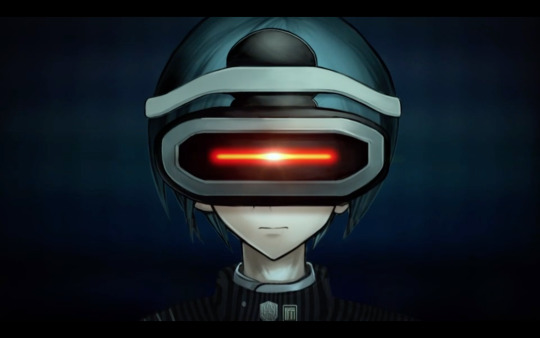
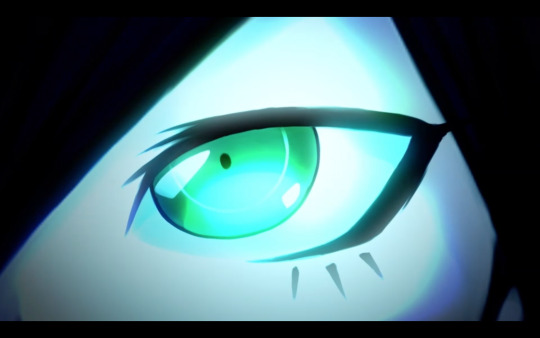
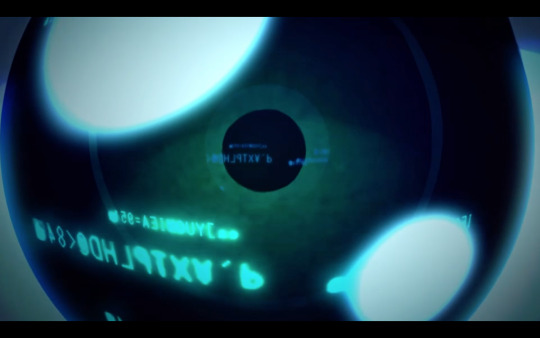
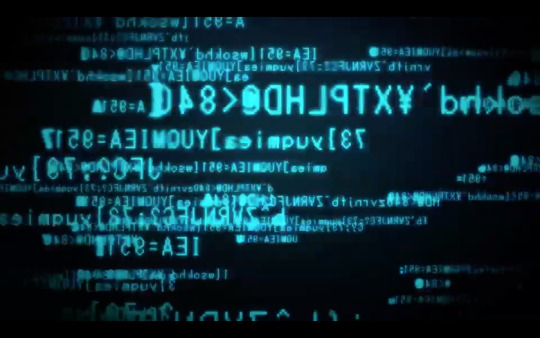
Oh cool we got a whole animated sequence!

I FUCKING KNEW IT

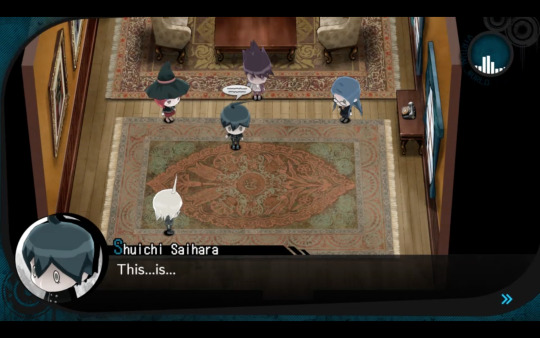
AAAAAAH!
AAAAAAH!
AAAAAAAAAAAAAAAH!
AAAAAAAAAAAAAAAAAAAAAAAAAAAAH!
THEY’RE SO FUCKING CUTE WHAT THE HELL
THIS ISN’T WHAT I EXPECTED AT ALL!!!!
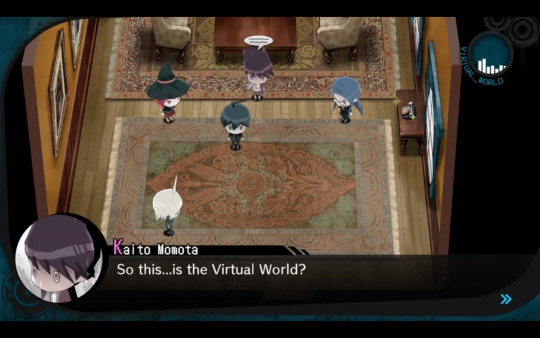
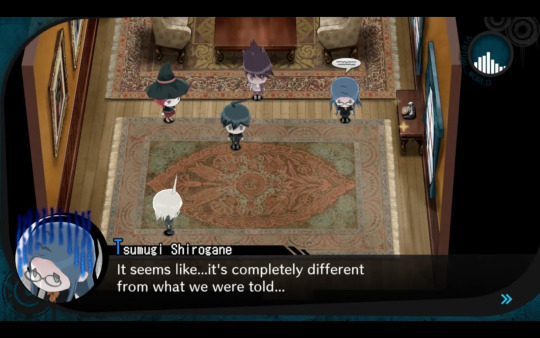
Yeah, seriously! I guess I was expecting sprites similar to Hajime’s from last game, or at least an island setting - this really does look like a murder mystery manor! good god we aren’t on rokkenjima are we
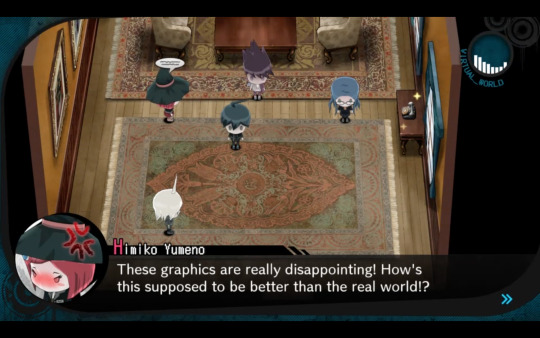
I’M SENDING A STRONGLY-WORDED LETTER TO THOSE IN CHARGE
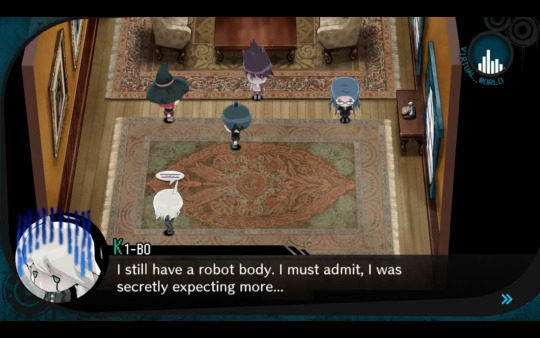
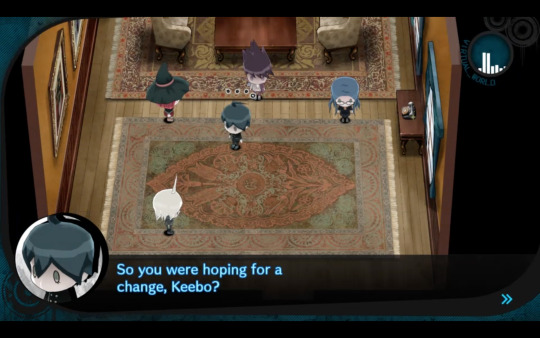
Aaaaw, it’s played off for laughs but it really is sad for K1-b0 to be constantly disparaging himself like that.
But there is good and bad about the new sprites, which someone who has been incredibly aware and sensitive of the changes in his own body probably clued into immediately...
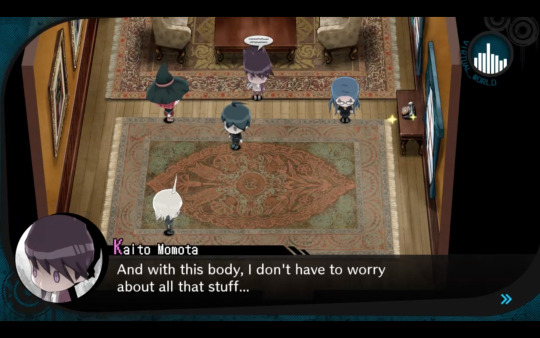
See now that the audience knows, he can slip and say stuff like this out loud, huh? It... almost makes me wish the scene at the end of the last chapter had taken place at the end of this one. That might just be a pacing thing though...
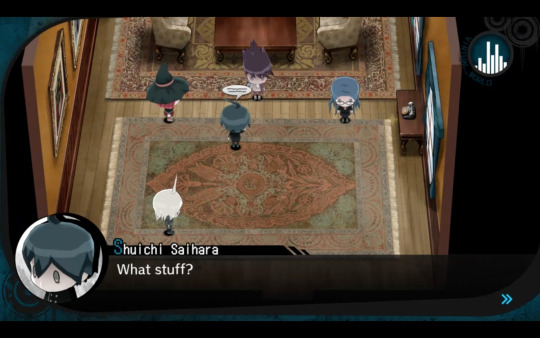
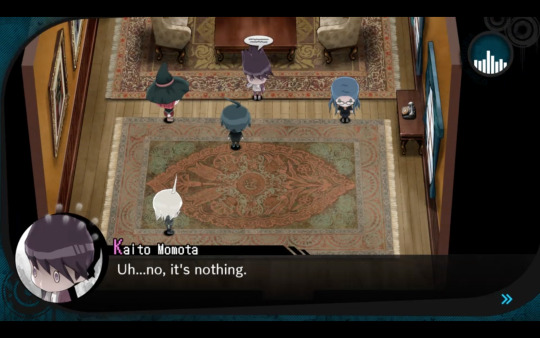
PUSH HIM DAMN IT
PUSH HIM ON IT SHUICHI I BEG YOU
... DAMN IT HE’S NOT PUSHING HIM.
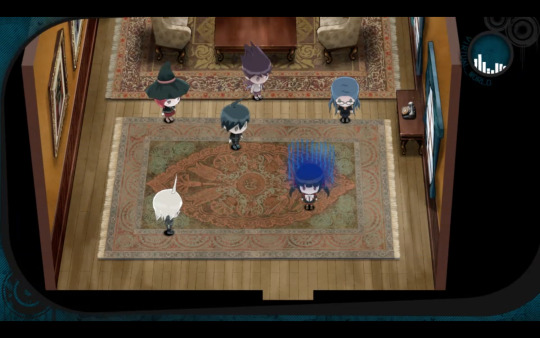
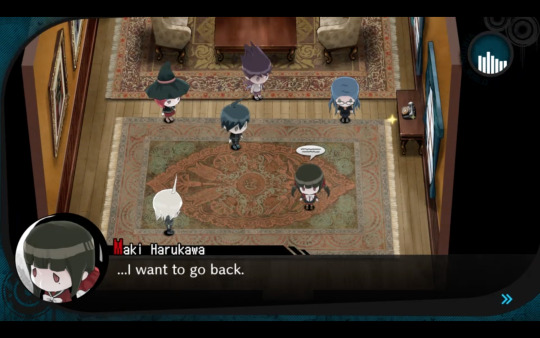
HA
I just realized, we’re going to see a lot more of people’s emotions thanks to the way the sprites work. I wonder if they directly translate to mood? Does that mean Maki and, hell, Kokichi will be more transparent here?
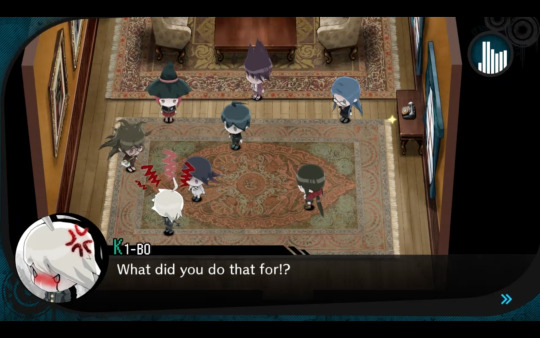
Omfg the literal first thing Kokichi does to K1-b0 is punch him!!! The robophobia never ends...
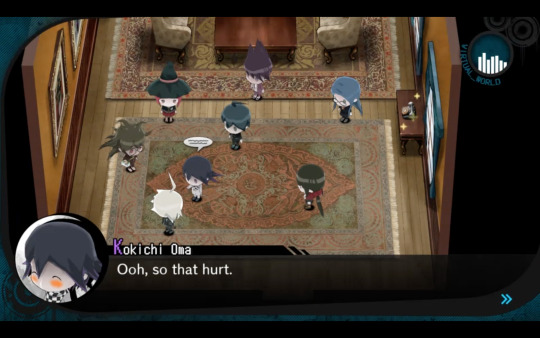
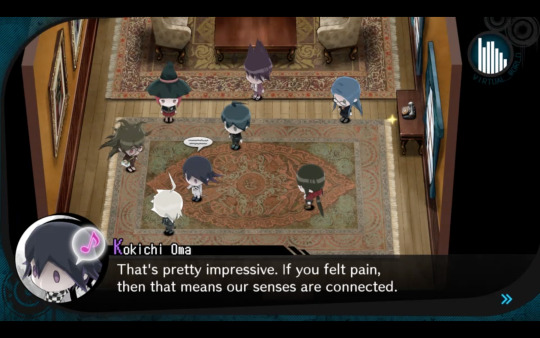
Wait, question though - how is it connected to K1-b0? I mean blah blah blah, brainwave technological voodoo etc is connecting all the other kids to the helmets, but what about for K1-b0? How does that work? I... guess it’s better not to think about it too hard? 8′D
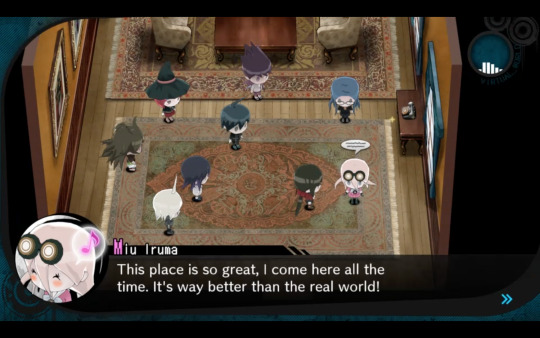
Man, Iruma’s a lot cuter here too. Also, seems like a good time to mention I’m totally in love with their little headshots at the bottom left with the little animated dialogue bubbles. The others might not like the sprites, but I like it, Miu! Maybe it’s just different when you’re in a 3rd person POV vs 1st person POV?
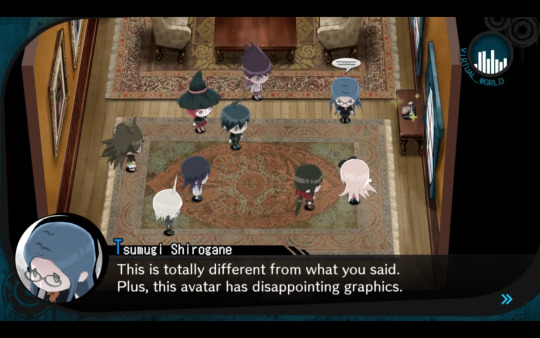
I love it when Tsumugi goes off like the total fucking nerd she is.
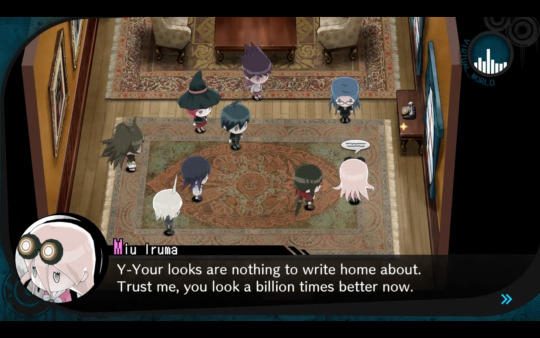
DAMN WE’RE NOT EVEN ON A TROPICAL ISLAND AND PEOPLE ARE STILL GETTING BURNED
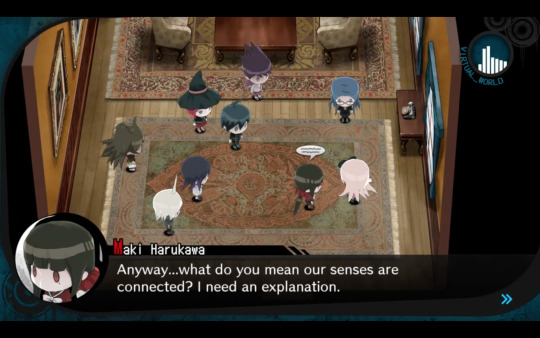
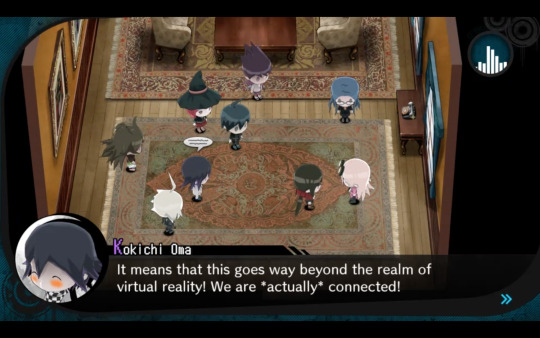
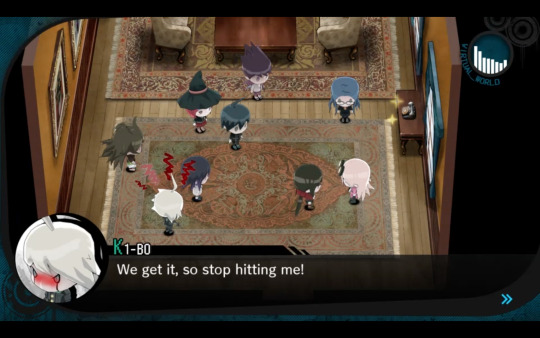
LEAVE K1-B0 ALONE KOKICHI JEEZ
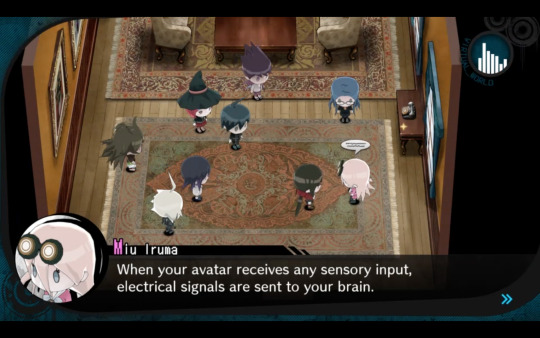
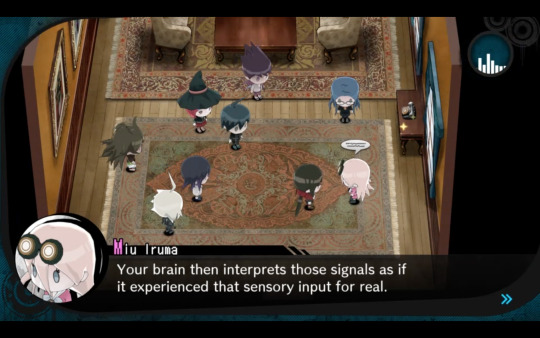
So basically they’re leaving the door open for someone to be killed in here. I figured that would be the case...
Kaito is pretty quick on understanding too which I appreciate, considering how they’ve been playing up his ‘brash dumb’ character type up lately.
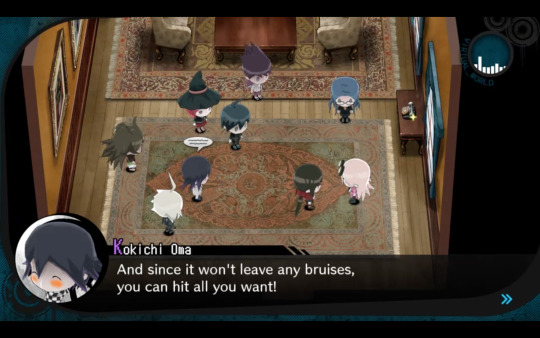
You are way too happy about that.
Though it also means that if someone dies in here, we’re not going to see any marks left on the body in the real world or here? That’s not good either!
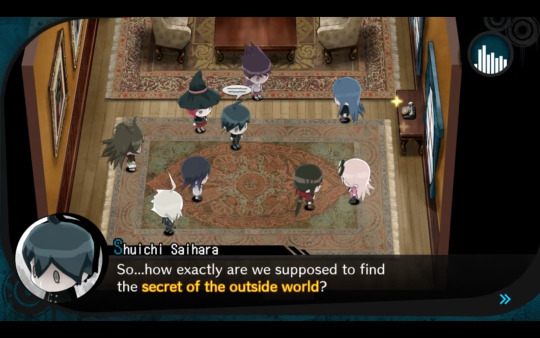
Yeah, that’s... honestly what I’d like to know. Seriously, wouldn’t Miu have found it when recoding everything if it was in here already? And if she did, why wouldn’t she tell them?
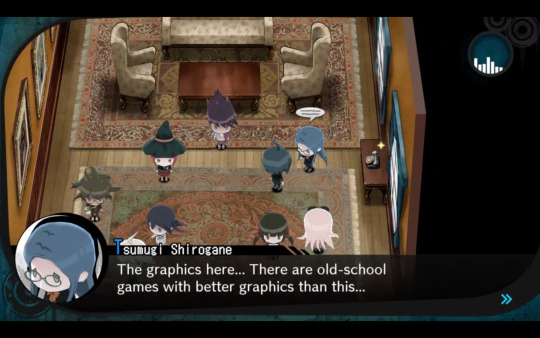
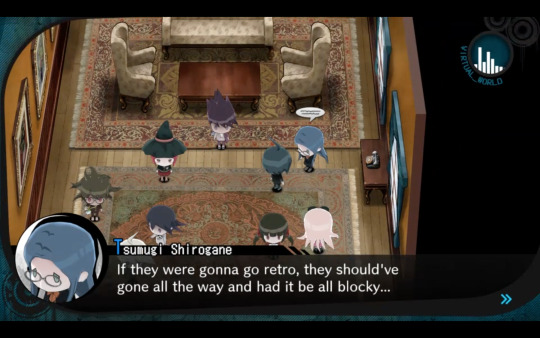
I’m telling you, Tsumugi being a snobby nerd will never get old to me. You know she’s got a N64, Super Nintendo, and maybe even older consoles like Atari and Dreamcast tucked away somewhere!
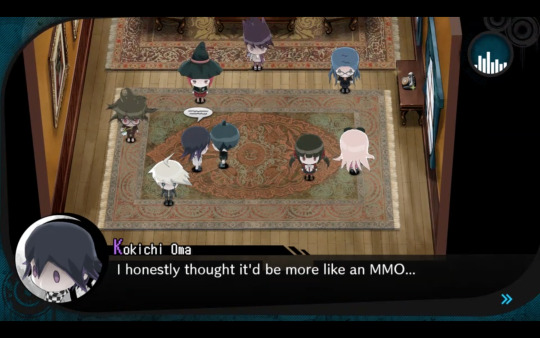
It’s funny - Kokichi doesn’t reference games nearly as much as Tsumugi, but he’s clearly a gamer too. Makes sense I suppose - I always think of a chessboard when I look at his scarf.
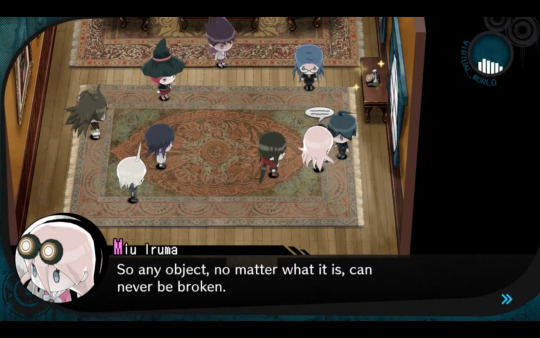
I’m sure this info will come in handy, but not sure how yet.
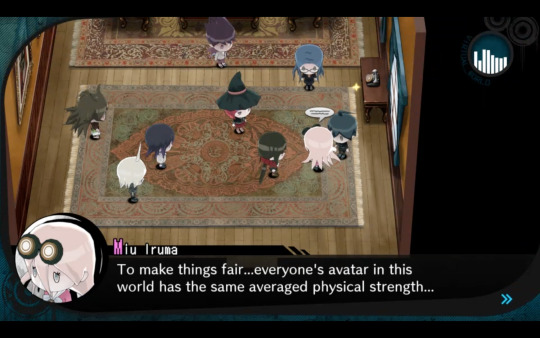
THAT WILL DEFINITELY BE IMPORTANT FOR GONTA-RELATED REASONS
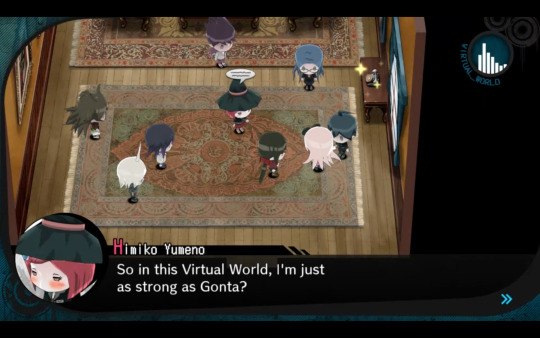
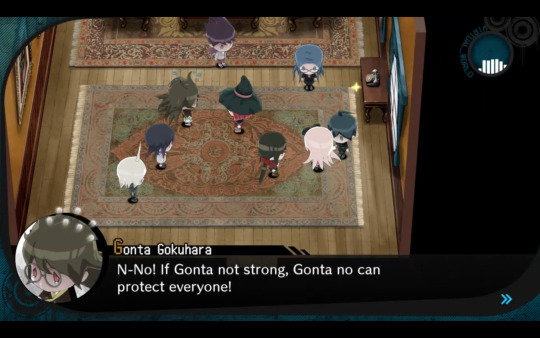
NO DAMN IT STOP DEATHFLAGGING HIM BY NEUTRALIZING HIS ADVANTAGES DAMN IT
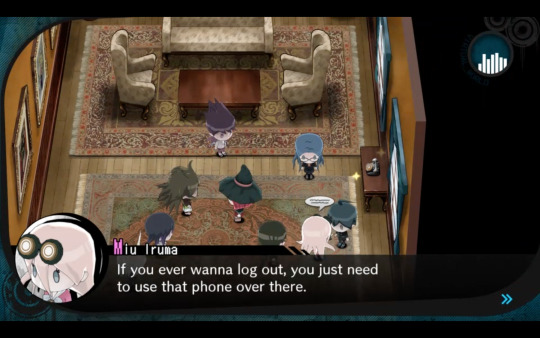
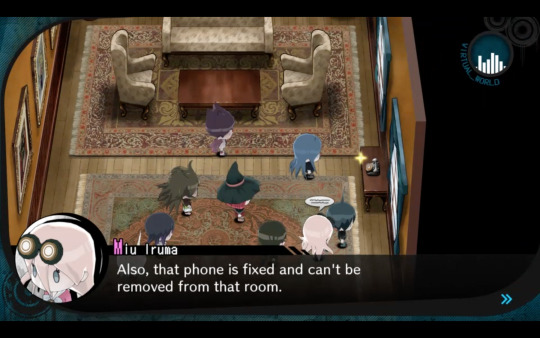
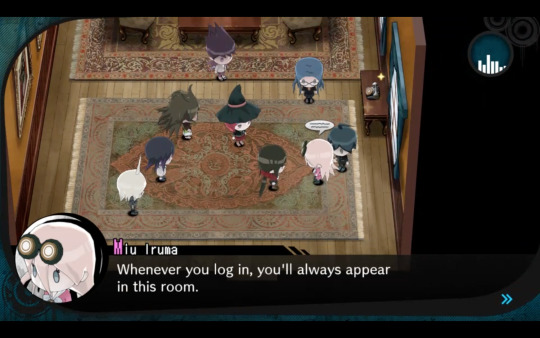
This... really sounds like they’re setting up the rules for a murder mystery game...
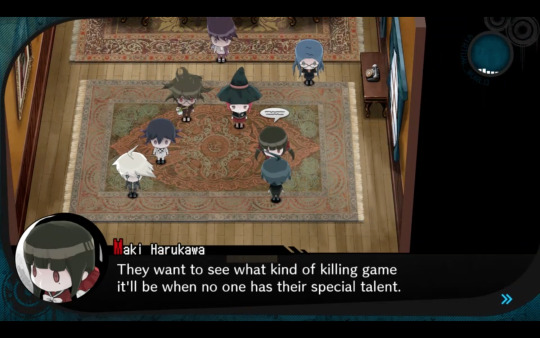
Maki made an interesting note about the game - when you take physical advantage away and talent in general, it’ll completely change how a killing game would potentially go down. But I mean... wouldn’t that just be battle royal-type slaughter? Not that any kind of killing game can be considered ‘elegant’, but I can’t help but wonder why a brutal option like this is available at all..
Also can I just say the remixed music and the cute little noises when they waddle around... I love this. I love this, guys. Also watching Shuichi run is hilarious tbh.
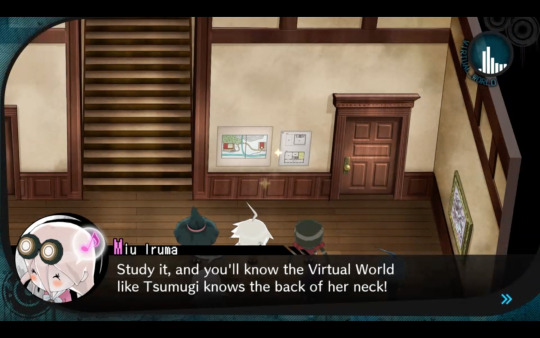
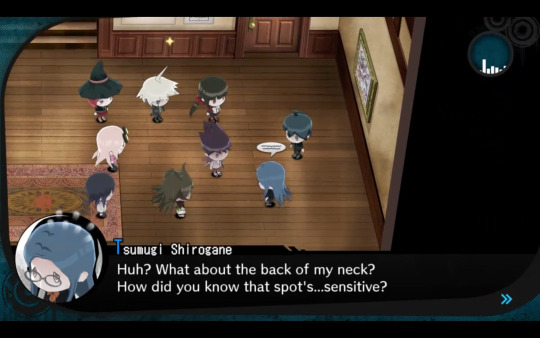
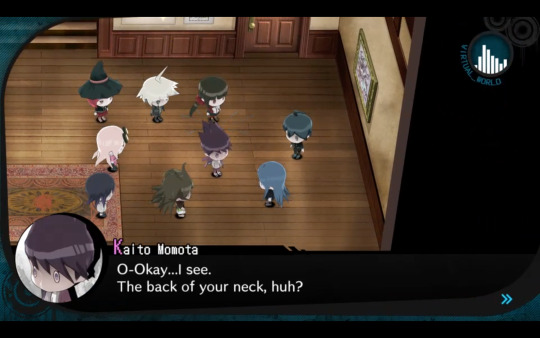
A wild rarepair Kaito x Tsumugi appears???
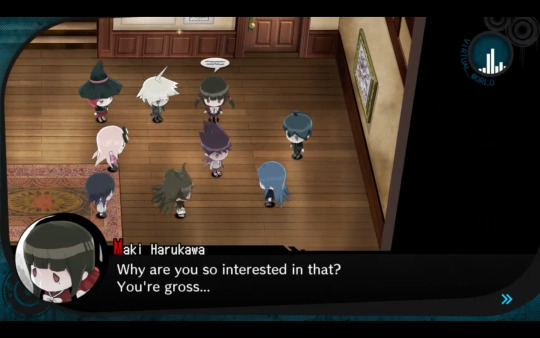
I’m telling you, we’re going to be seeing more of everyone’s genuine emotions on their face here! Man, I’m really liking this set up already.
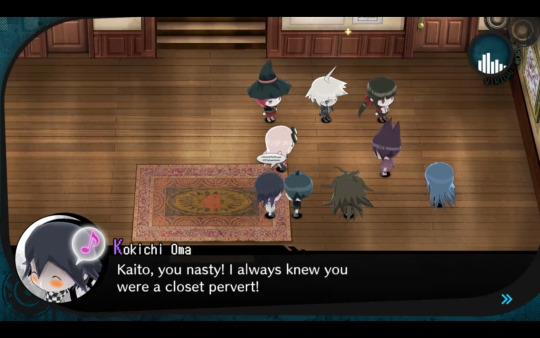
Kokichi is desperate to ship Kaito with anyone other than Shuichi so he can have Mr Detective all to himself
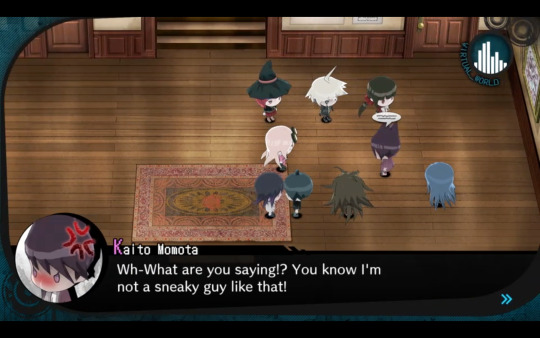
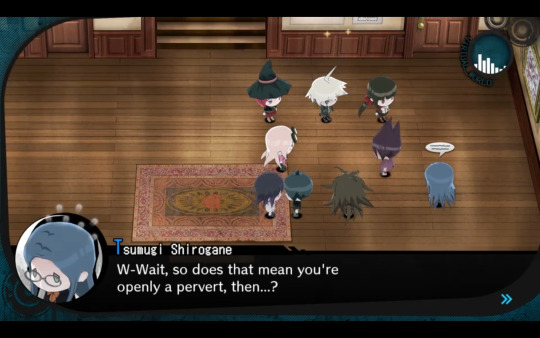
I think it means he falls for Kokichi’s verbal bait way too easily. 8′D But hey, Tsumugi doesn’t seem to be against Kaito’s interest! Not... obviously, anyway. just gonna casually that pairing to the question mark pile...
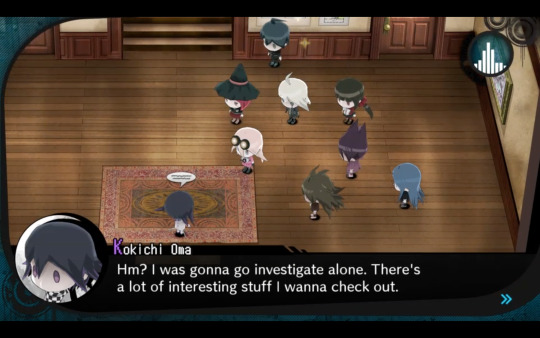
Yeah, that’s a pretty classic Kokichi move and... that’s... also a really bad idea. Maybe this is a good chance for Shuichi to get to know him in the context of the game as opposed to FTEs?
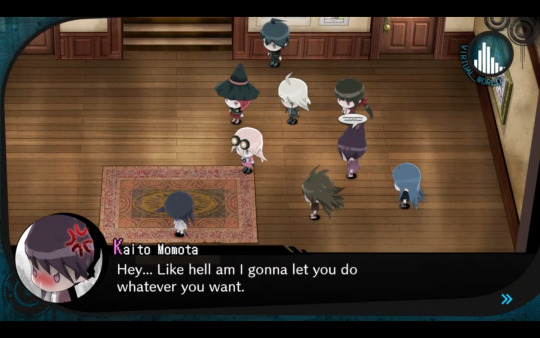
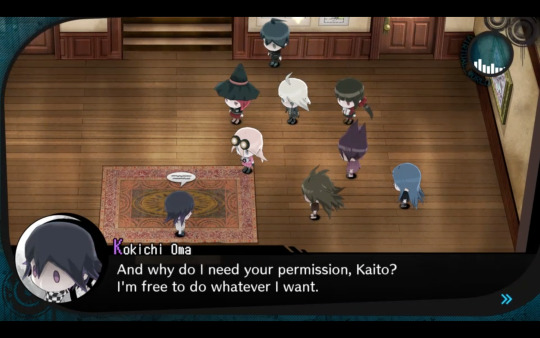
Okay, is it just me or is he trying to piss Kaito off especially right now??
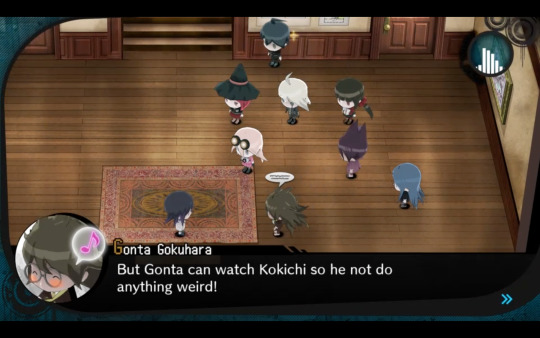
NO GONTA YOU’RE TOO GOOD FOR THIS WORLD AND THE ABSOLUTE WRONG CHOICE TO WATCH KOKICHI
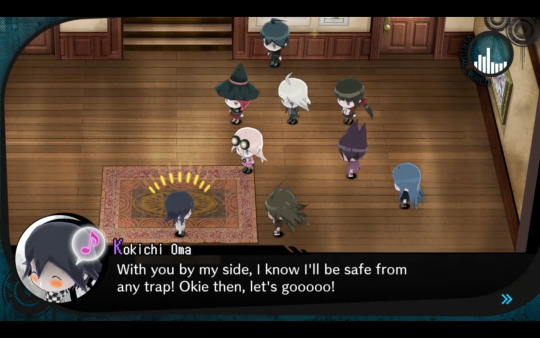
fml if Kokichi gets Gonta killed which is where I feel like this is going I will be so upset - but I feel like Kokichi won’t do it himself??? Maybe someone attacks Kokichi and Gonta puts himself in harm’s way instead and dies instead? Like, Kokichi is basically turning Gonta into a goon of his, and we all know what happens in movies and games to the henchmen of ‘Supreme Leaders’...
Honestly guys, how soon do we forget? Are we really going to let them go off together like this? The Bug Meet-and-Greet was literally just a week ago! I know a lot has happened since then, but still!
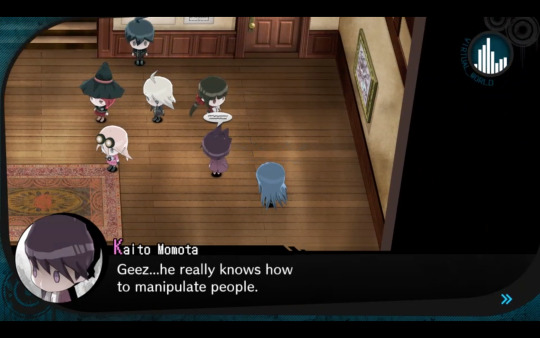
I do like that both Maki (not included) and Kaito caught on that Kokichi pulled that trick on purpose to have Gonta with him - I just wish they followed up!
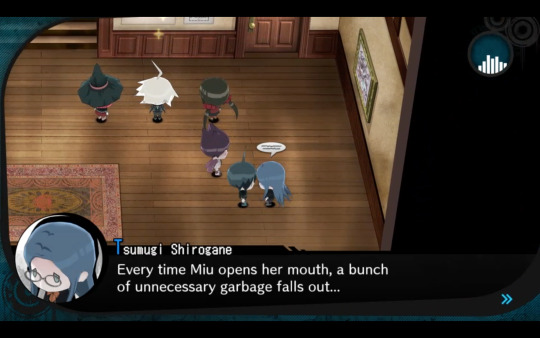
On the other hand, we could just as easily get Tsumugi murdering Miu lmao. I’m telling you, if Miu shows up dead...
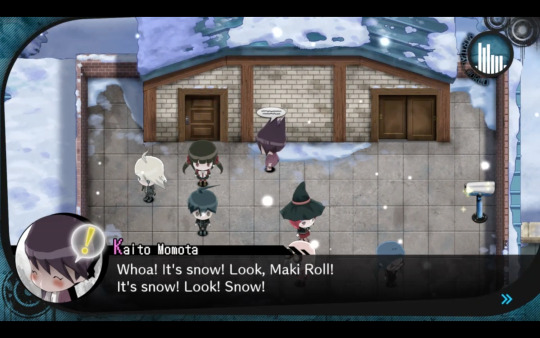
I didn’t need this in here but I kept it because he’s adorable like this
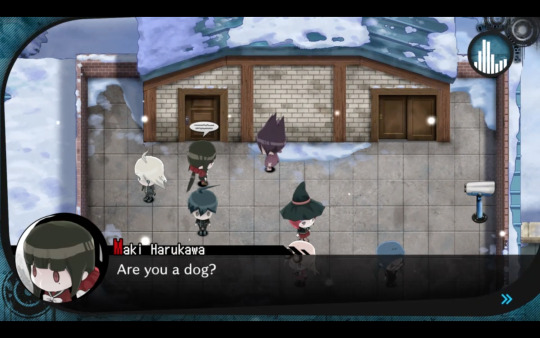
SHIT THAT’S RIGHT THAT’S HOW MY DOG REACTS WHENEVER HE JUMPS IN THE SNOW I-I mean don’t call Kaito a dog, Maki! That’s not very nice even if it is accurate
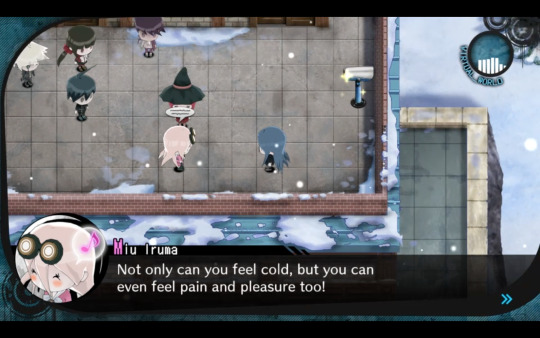
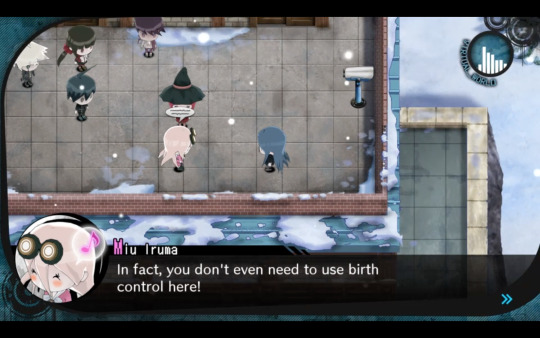
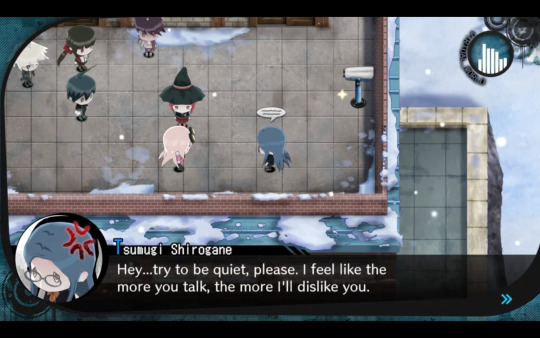
Man, I’m starting to wonder if Tsumugi is going to kill Miu here for real 8′D
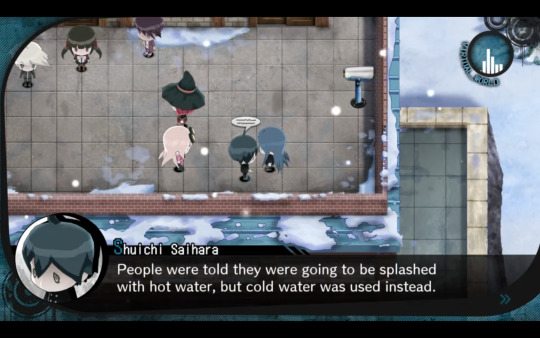
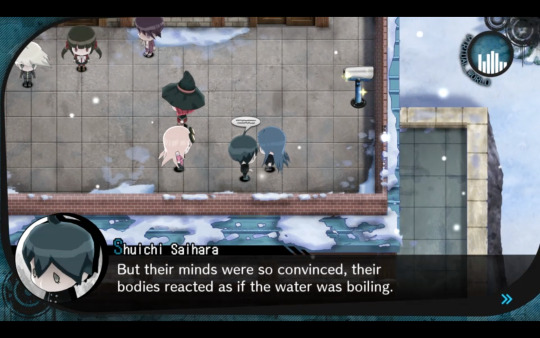
Always a ray of sunshine, our Sweetcheeks. I’m leaning towards them having some sort of incident happen by the end of this, if not an outright murder. They’re talking too much about how the brain and senses experiencing ‘death’ and causing the body to follow suit for them not to do anything with it. I mean, I guess the exception would be if it’s talking about an overall VR experience like the last game!
So the storage room is pretty much empty and the binoculars can only see as far as the line on the map which Miu is going to explain too. Man, the more things get set up, the more convinced I am that someone isn’t going to make it to the end of the chapter...
Next K1-b0 has an interesting bit of dialogue about how there’s nothing beyond the walls of this world, and how it makes him think about the academy walls. Which... again, I think is leaning towards an apocalyptic world/space scenario? It certainly seems that way to me. It’s interesting to have him point it out though, for some reason. 8′D
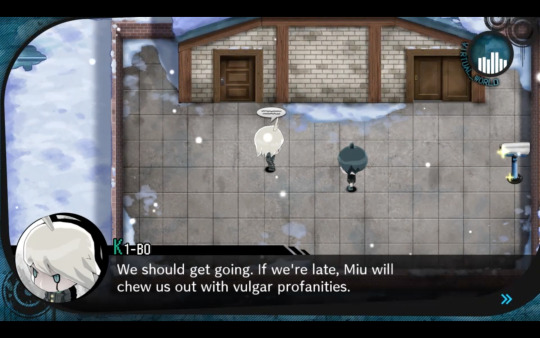
I’m 99% sure that’s her default setting, but okay.
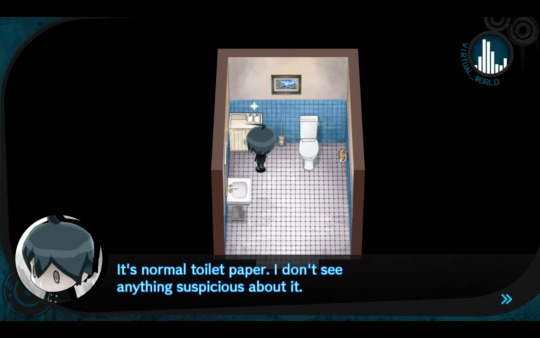
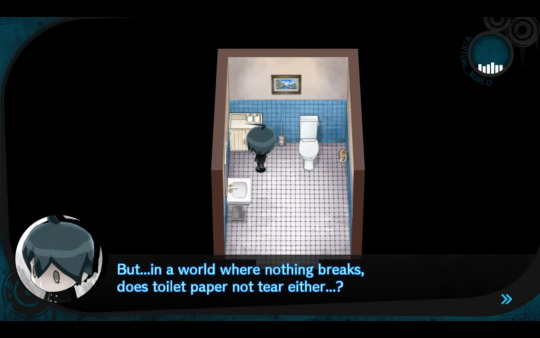
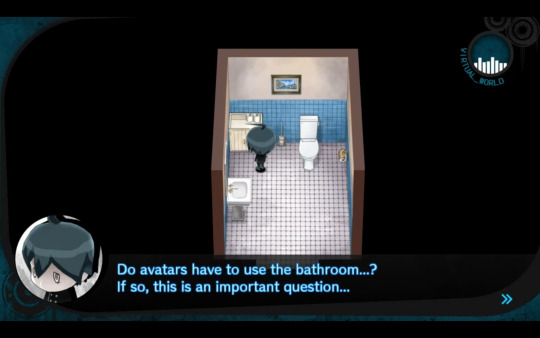
weird tangents like this is why I love shuichi
It’s like, a legitimate thing to fixate on and worry about and I totally relate to it but at the same time I’m sure he recognizes how ridiculous it sounds in his head
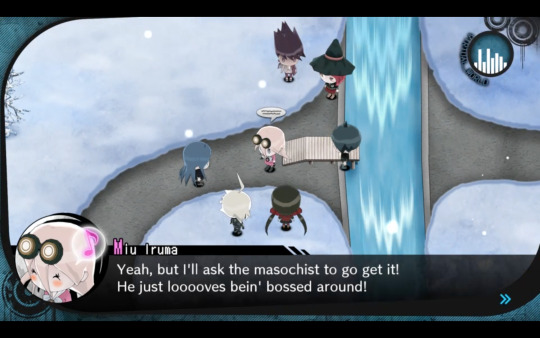
Isn’t that you? 8′D
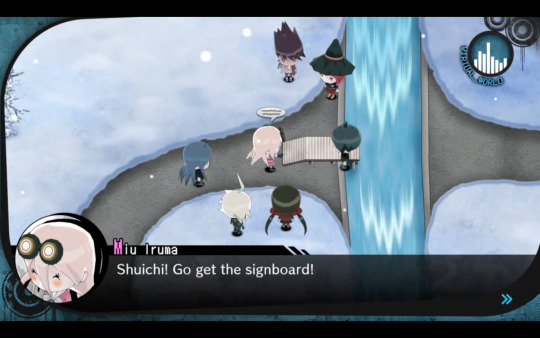
oMFG WH A T
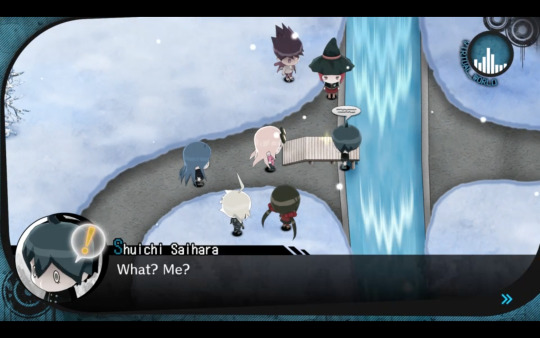
WHY ARE YOU DOING HIM WRONG LIKE THIS MIU
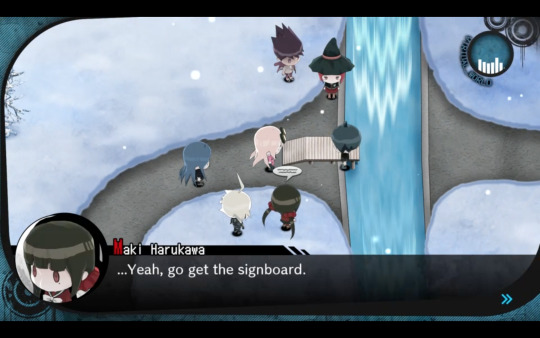
MAKI NO I THOUGHT YOUR ROASTING DAYS WERE FINALLY BEHIND YOU
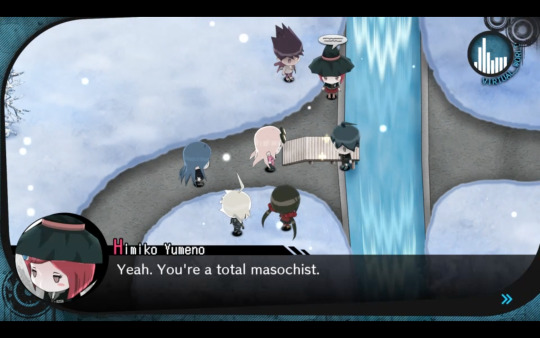
HIMIKO I THOUGHT WE WERE BONDING EARLIER
WE WERE BONDING DAMN IT
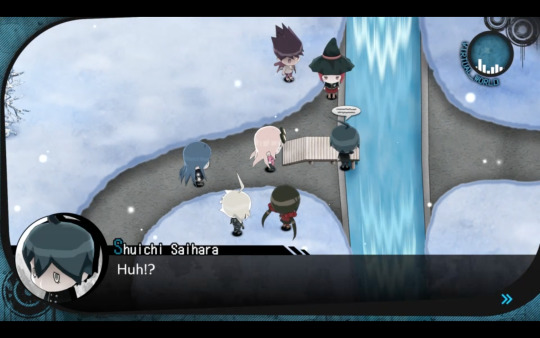
I’m shocked that the sprite is able to capture the absolute betrayal on it face but somehow, it does
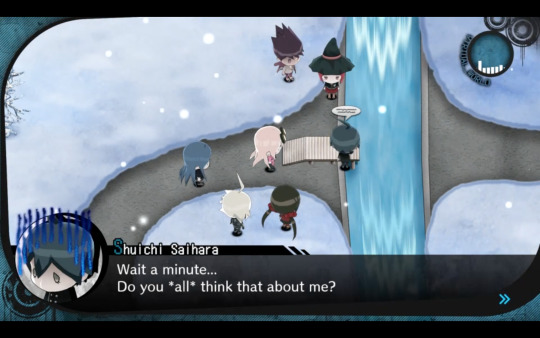
whispers this is getting its own special post
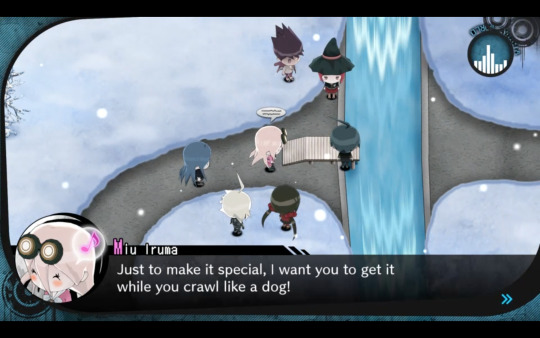
“Look at my glorious self, doing you the favour of allowing you to prostrate yourself in front of all your classmates!”
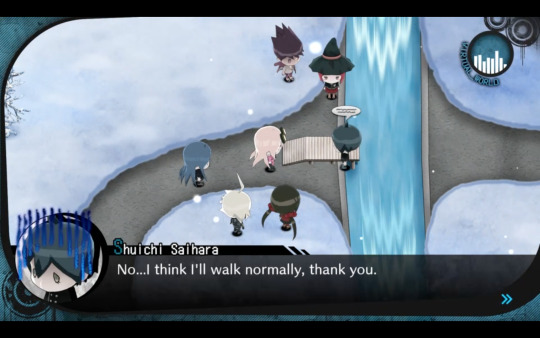
Miu you’re making a lot of enemies this chapter, including the sub (lol) protagonist. We've already had one first POV murder - do we really want another one?
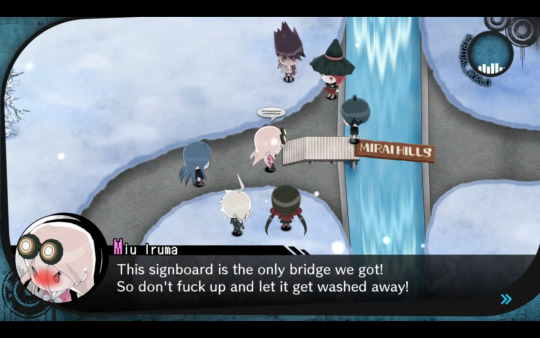
That’s going to go missing at some point. If the murder happens, maybe the murderer will grab it and hide it or something?
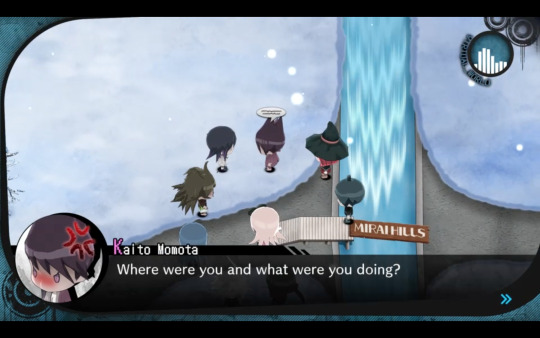
"Oh, I’ve been lurking here for a while! But I needed some time to come up with my best masochist!Shuichi jokes and lines. You’re not going to hear the end of this for a long time, Masoichi Subhara!”
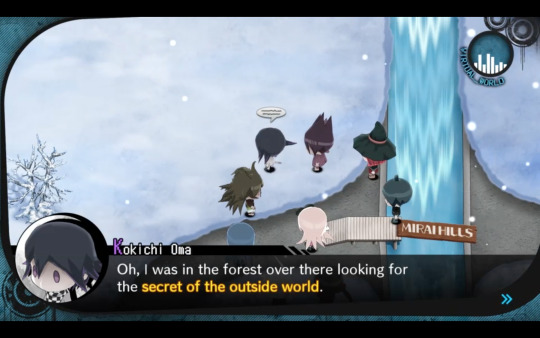
... or that. could be that too.
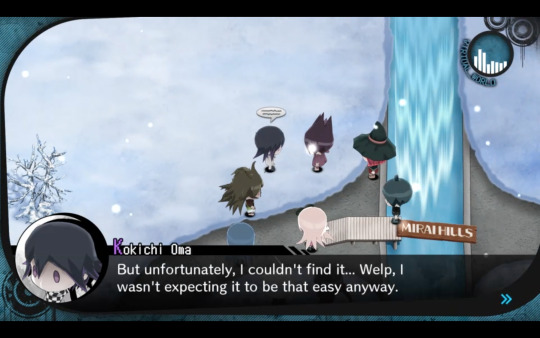
Hm, so I guess it’s on the other side of the map. It would be one thing of Kokichi is by himself but Gonta is with him and I trust him way farther than I’d be able to throw him and Kokichi for that matter
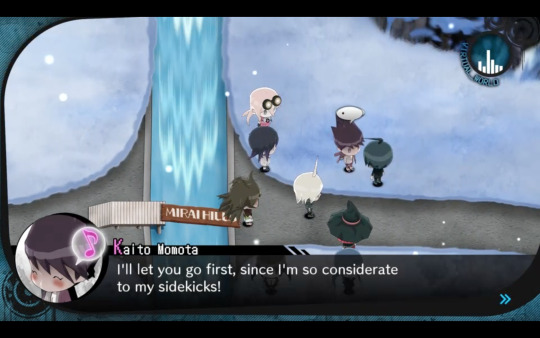
KAITO NO YOU’RE MAKING THINGS WORSE
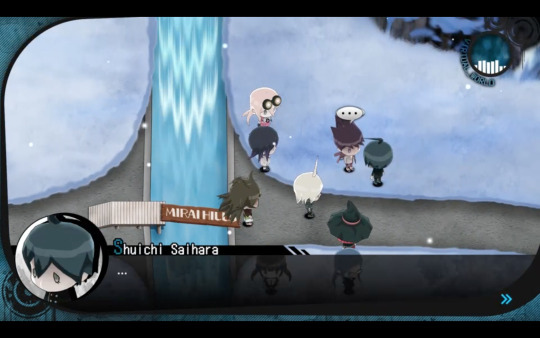
OMFG SHUICHI IS JUST A COMPLETE WRECK AFTER WHAT JUST HAPPENED
And you know Kokichi is totally trying to figure out what he missed, and why all the other classmates are giving the two of them weird looks/snickering...
Oh, and now we’re finally getting to the line shown in the map.
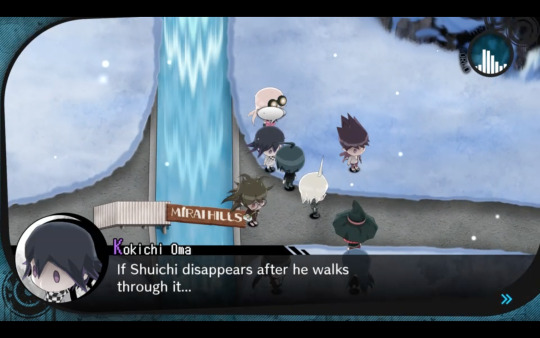
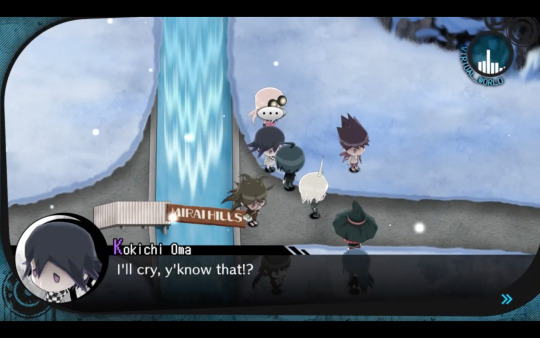
Kokichi are you just trying to cash in some Saiouma chips because you realize how much Saimota happened when you were away with Gonta? 8′D
H-Hey don’t look at me, look at Miu! She started it!
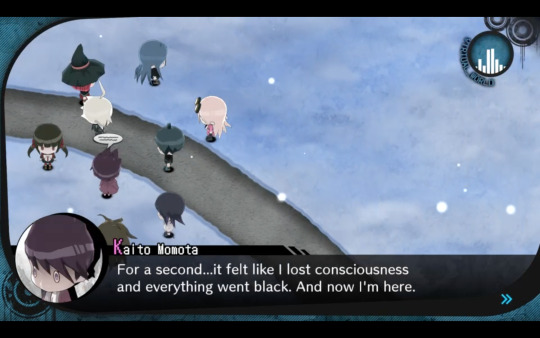
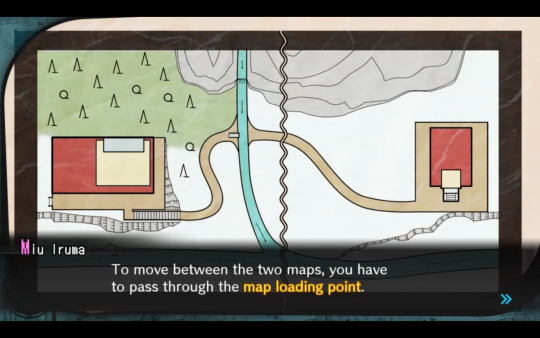
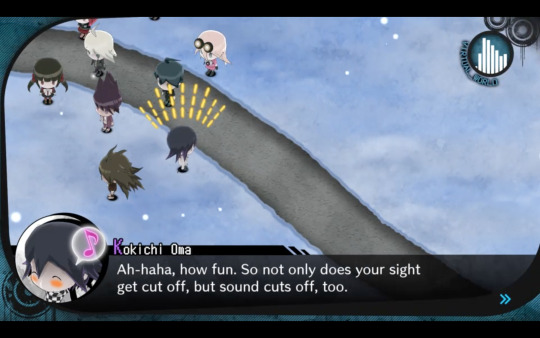
Okay at this point I will be shocked if there isn’t a murder here or some sort of incident causing a murder in the real world.
Also Kokichi you’re way too happy about this...
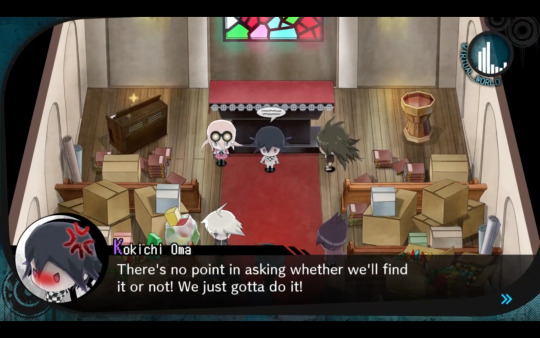
What are you playing at here man???
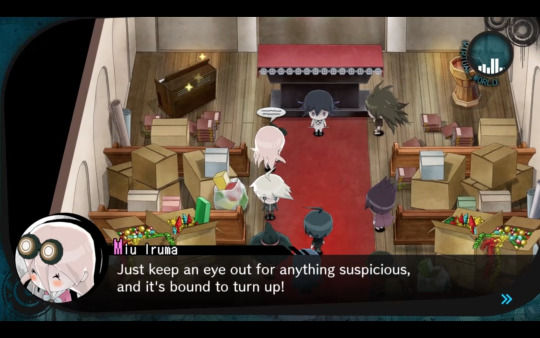
And you! Shouldn’t you know where it is since you reprogrammed the whole thing?!?!
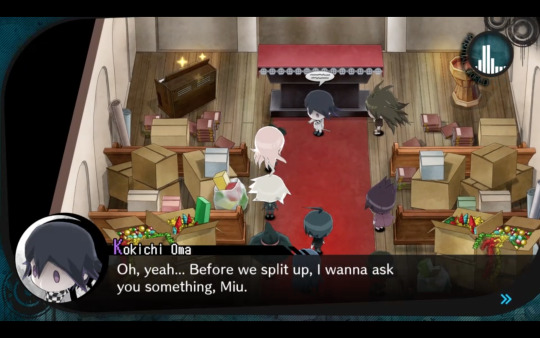
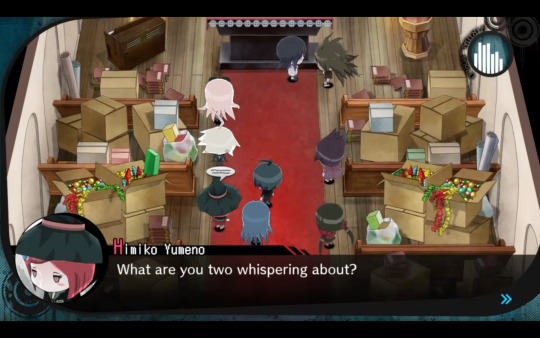
Miu and Kokichi are conspiring about something??? Again???
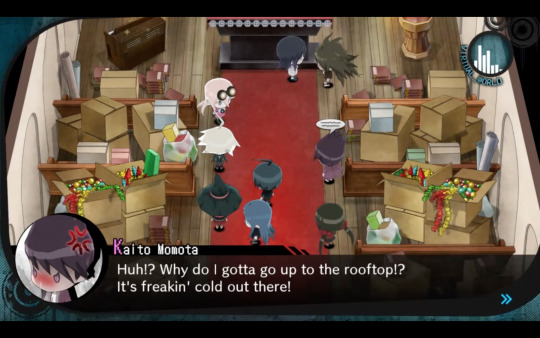
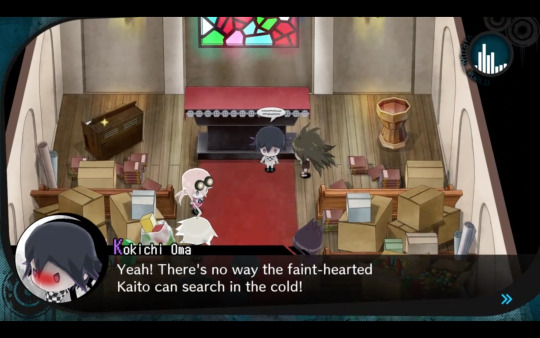
Please don’t fall for it...
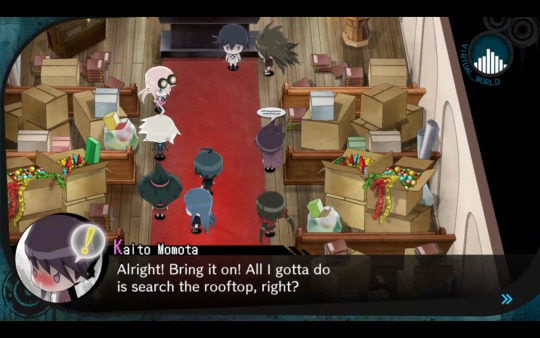
..... Yikes. 8′D I-I’ll give it to him because I have a feeling his failing health and the events of last chapter regarding the occult probably have him feeling emasculated.
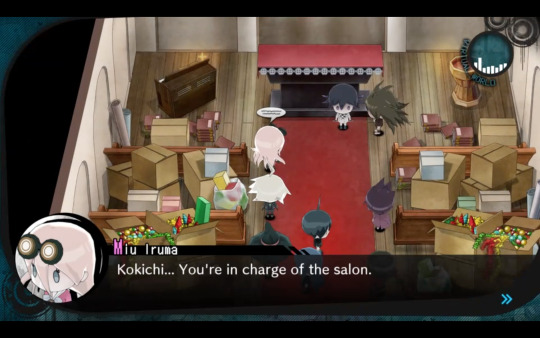
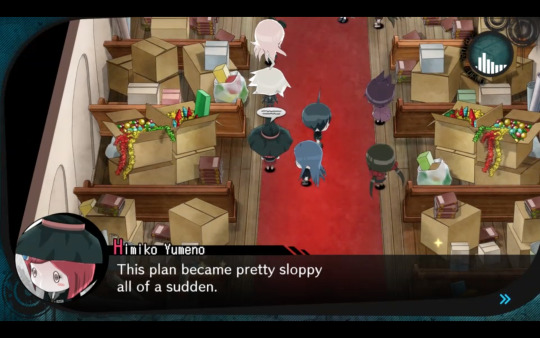
Yeah, seriously. So Kaito is on the roof, Kokichi is in the salon and... free for all for everything else. Uh, okay....?
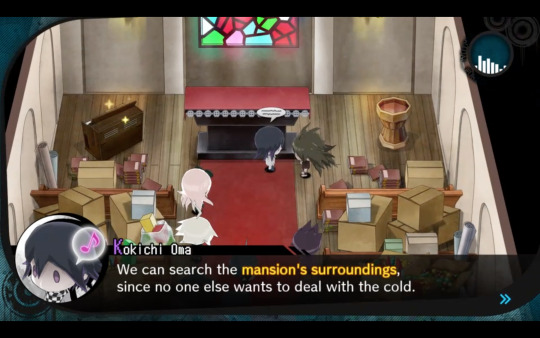
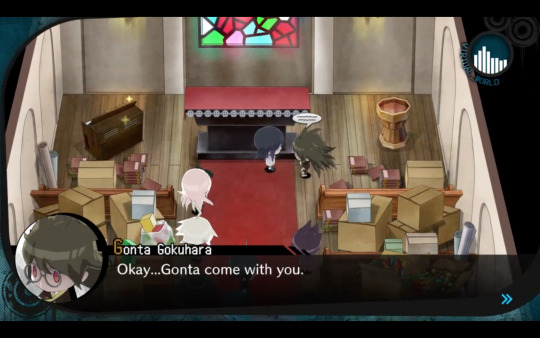
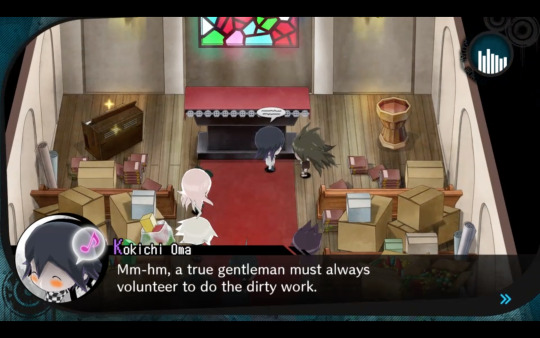
IF GONTA FUCKING TURNS UP DEAD KOKICHI I SWEAR I WILL DUEL YOU IN A SHADOW GAME MYSELF duel links has upped my skill somewhat I should be able to hold my own...
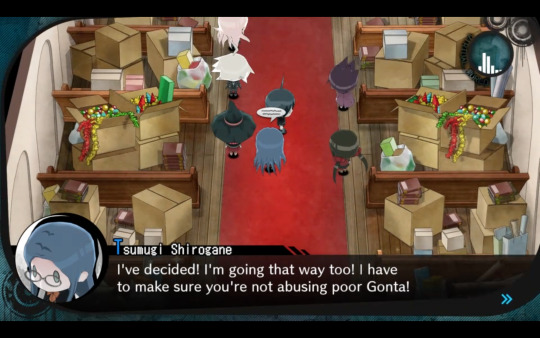
Thank goodness for Tsumugi’s odd affinity for Gonta oTL
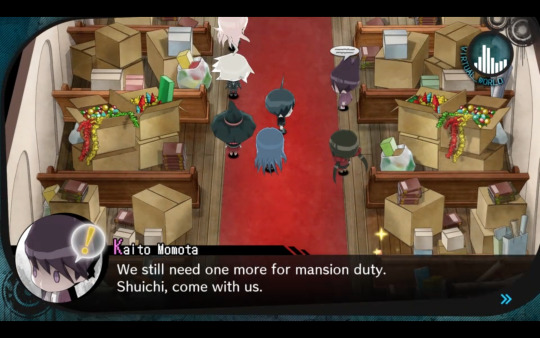
a) Maybe this is the chance for us to get to know Tsumugi a little better in-game since we’re going to explore the rest of the mansion together
b) Kaito really has no bloody idea how he and Shuichi’s relationship comes off to the rest of their classmates (or maybe he does and he’s a-okay with it)
c) MAKI......
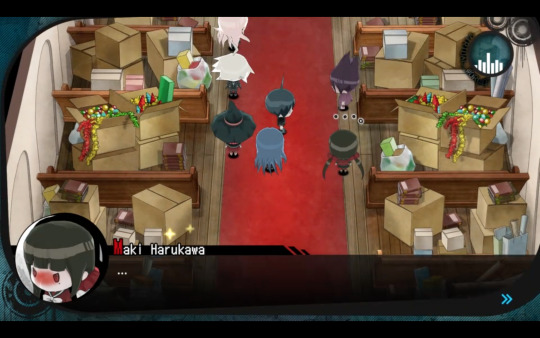
oh no
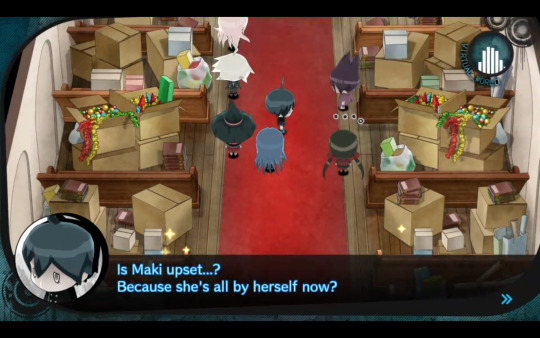
THAT’S.... NOT..... QUITE IT.....
nothing like the sting of figuring out you’re third-wheeling
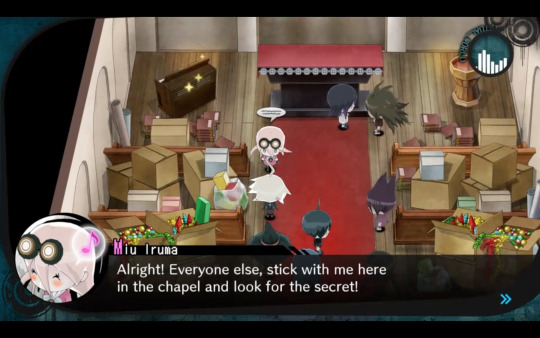

This is in no way the game trying to establish groups and/or alibis. Got it.
Left side: Kokichi, Gonta, Kaito, Shuichi, Tsumugi
Right side: Miu, Himiko, Maki, K1-b0. Alright, good to know.
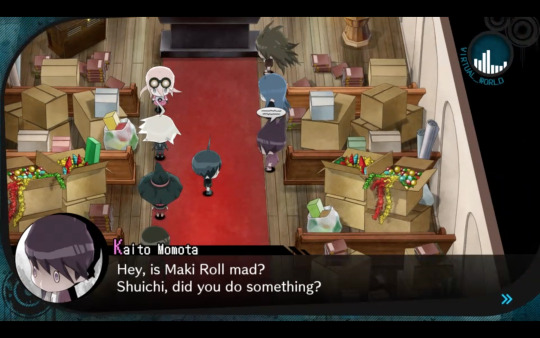
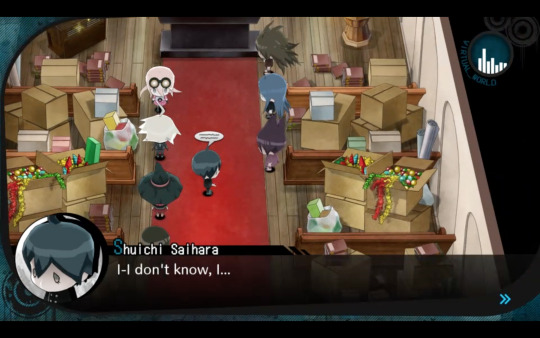
I really don’t need this to be here but the fact that Kaito is so woefully oblivious and also apparently just... completely into Maki as a friend only is hilarious to me. I mean, maybe the game will push more romantic feelings on his side in the last chapter but he’s just coming off as so gung-ho about their friendship without taking it to the next level - it’s just.... so refreshing...
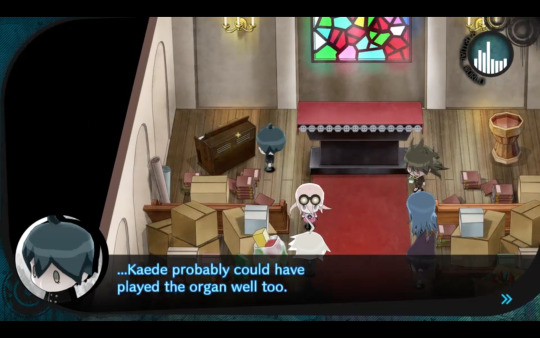
It’s nice to see Kaede always being in his thoughts outside of general ‘I must do this for Kaede! Inspiration via manpain!’ stuff.
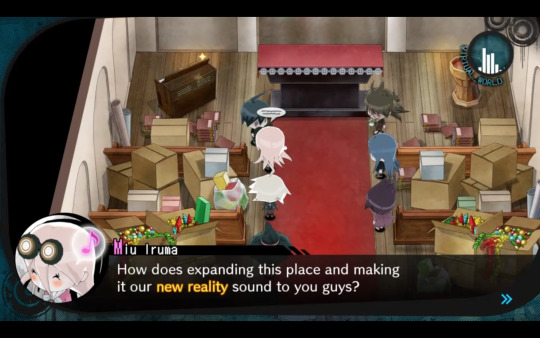
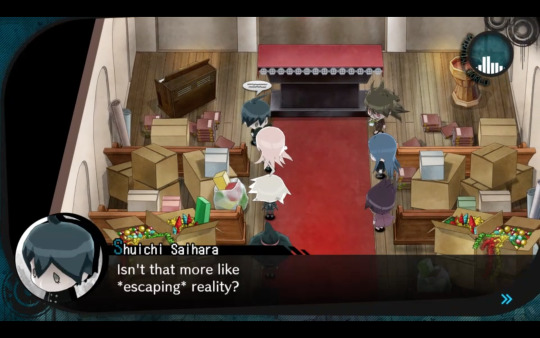
FUCK YES I THINK I’M RIGHT ABOUT THE ESCAPISM SECONDARY THEME we’re finally bringing it up in nearly identical words again! sorry tsumugi things aren’t looking good for you mastermind-wise
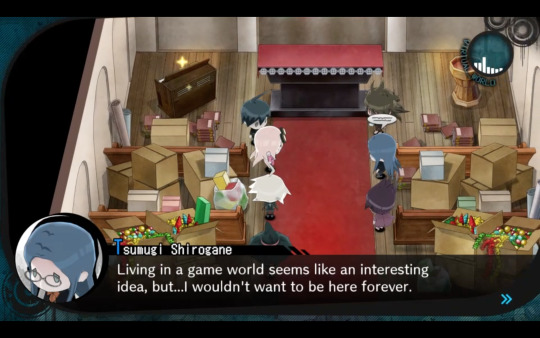
With that said, of all people, she dismisses it herself. 8′D Maybe if the game had better graphics engine - would that be good enough for you princess???
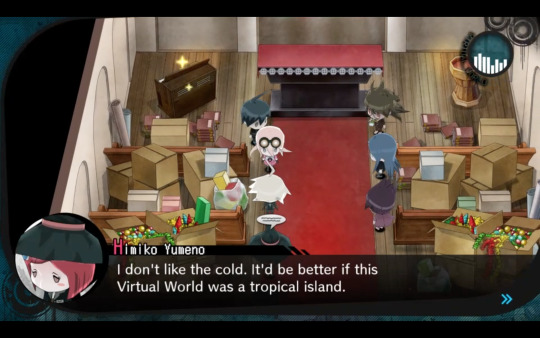
DANGANRONPA YOU ARE DANCING ON A KNIFE’S EDGE RIGHT NOW
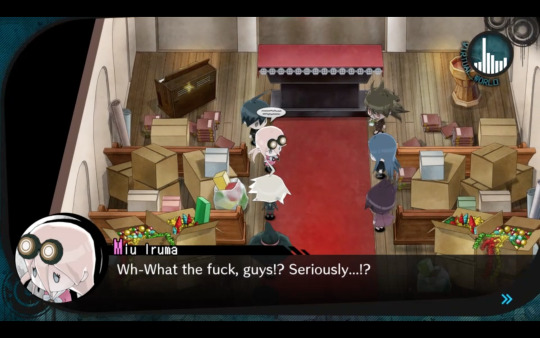
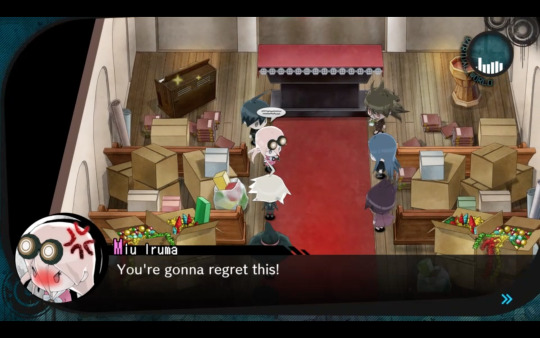
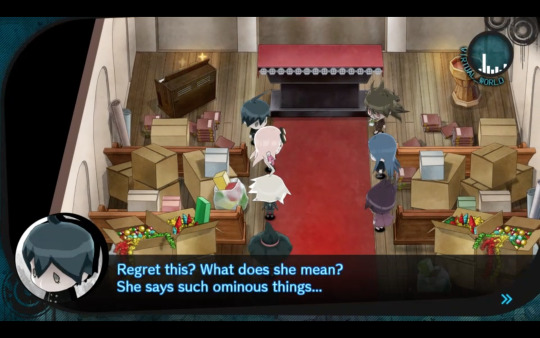
Man I keep dancing back and forth between the idea of her being a victim this chapter and a killer and I just... can’t... decide on one. Ugh. The only thing that keeps me from thinking she’ll be a victim is having Gonta right there, raising just as many death flags as her. I-I guess we’ll find out shortly anyway...
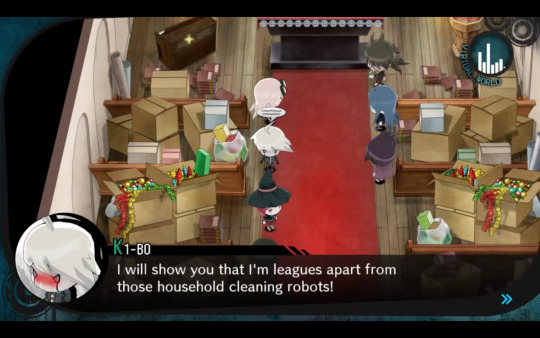
Meanwhile while I ramble, K1-b0 has Priorities
#Shuichi Saihara#Kaito Momota#Miu Iruma#Ryou plays drv3#Kokichi Ouma#Kokichi Oma#Kiibo#K1-b0#Keebo#Gonta Gokuhara#Maki Harukawa#Tsumugi Shirogane#I don't know why these are taking so long but this has been haunting my dreams and waking thoughts for the past.... week#omg it's been pretty much a week#meanwhile my#saimota#loving ass cannot be stopped#spoilers#drv3 spoilers
28 notes
·
View notes
Text
Wrote a new scene, made some tweaks. Writing dialogue is the hardest fucking thing in the world to me so idk how I feel about it lmao. :3
.X.
Eriibeus’ personal research log, 412.89AU
The people of Rolveon IV are currently undergoing what could be considered an equivalent to an early middle ages, characterized by trifling king and queendoms or small city-states constantly at war with one another for the sake of territorial dominance, as well as a general lack of record-keeping or cultural output. Their current timeline is marked as following the invasion and subsequent defeat of the Obrox armies around 230-sum years prior. They are primarily a feudal society, separated into peasants, nobles, clergy, and those whose status is granted to them by the Gods, and their overall worldview is highly theistic. They have yet to conceptualize most scientific studies; their observations of the natural world are often explained via religious texts, known amongst the population as “The Sacred Codices”, and those within the clergy are often the most highly educated. They do have words for several basic sciences, such as astronomy and/or astrology (often used interchangeably), alchemy, and anatomy, among a few other protosciences, but they appear to think of these subjects as being completely dissimilar to one another, totally uncorrelated. Unfortunately, the majority of the advancements made by the Rolveon ancients seem to have vanished. Scientific documents kept by the Obroxian Empire were either lost during the invasions or destroyed afterwards for being “Obrox heresy”.
Though still a largely god-fearing people, the Obrox invasions somewhat forced the Rolveon people to make changes in their societal lives. When neighboring domains found themselves confronted with Obrox armies, a need arose to form civilian militias to defend their lands, and a shortage of men meant that it was necessary to have women to work and fight on the frontlines, as well. Although it is obvious that women are still primarily domestic workers, it is not uncommon to witness a female soldier, or physician, or clergy member.
Unfortunately, they seem to be a rather petulant people, waging wars of aggression against neighboring domains, or initiating conflict with their fellow Rolveon with little to no consideration put before their impulse. Despite this, or perhaps because of it, they take the practice of medicine and study of anatomy extremely seriously, as evident by their extensive medical logs, which is even more noteworthy considering their lack of any record-keeping at all. Physicians are often clergy members, and are more often than not the local monarch’s head advisor. The increased need for medical knowledge seemed to have developed around the time of the Obrox invasions and has been on a steady incline of progress ever since. It is this medical prowess which is my reason for being here.
Word of their innovations (though primitive by any modern standards) has spread quickly among the niche biology forums I subscribe to online and I have found myself intrigued enough to spend mine and Kathria’s downtime interacting with their people and studying them directly, rather than from a standard observation post. Their practices are not perfect and they still have much to learn. Hygiene, for example, is frequently overlooked. I inadvertently instilled into them the idea of washing your hands before contact with patient, a concept which was before unheard of to them but they now actively implement into their daily lives. Often times, they are far from accurate as well, considering they still place much of their reliance on their Gods or unseen forces which they cannot control. But regardless, they work with surprisingly sophisticated models for surgery, alchemy, and treatment of illness. I’ve done my research and no documentation of any known advanced civilization having visited Rolveon VII in the past exists, so I am left to believe that these are their own unassisted discoveries, which I greatly admire.
I have been accepted to serve as an apprentice under the personal physician of King Acruxum of Okuil, a relatively poor and unknown kingdom which mostly serves as a stopping point for travelers between two adjacent, higher-profile domains. I figured this would be helpful in my attempt to remain off the Rolveon radar. I have disguised myself as one of their people using a basic holograph program which I made alterations to myself to ensure a more natural look and higher stability. It would surely be awkward should the programming fail while I am surrounded by Rolveons. I claim that I am from a made-up city-state very far south of Okuil. In order to be accepted for apprenticeship, I was required to undergo an exam. It was very similar to my primary school biology entrance exam: there were many inquiries about basic medical and anatomical subjects, as well as a literacy evaluation. Needless to say, I passed. I was also required to swear an oath that I would devote my practices to serve the Holy Trinity (in The Sacred Codices, the Holy Trinity refers to the father, the mother, and the child of the two, who together created the universe), but I have no intention of holding true to that pledge.
Kathria has expressed to me her concern with this mission of mine, claiming that it has potential to interfere with the natural development of these people, and is thus immoral. I disagree, as my intention is not to interfere, but to strictly observe. Aside from teaching them the importance of washing your hands, I have made no significant impact on anyone that I have interacted with thus far. My apprenticeship begins tomorrow, and I am eager to bear witness to their fascinating practices first-hand.
.X.
“Should I waste my breath a final time by telling you not to do this, or will you simply ignore my words again?” Kathria asked sarcastically as Eriibeus made some final adjustments at the teleporter control panel. Accuracy was always a necessity when utilizing this device, but for these purposes it was of even greater importance to ensure that he be transported far from civilization, lest the religiously minded people of Rolveon IV witness his sudden manifestation.
He flattened his antennae, thoughtful. Not in rethinking his mission, of course, but rather searching his mushroom bodies for a new response to this argument they had already had countless times since their arrival into orbit. “Kathria, please, it will be okay. I have already told you that I will be there to observe, nothing more. I’ve taken the precautions needed to secure an unsuspecting infiltration. They will be none the wiser of my presence.” He paused. “Even if things should go wrong and they discover I am not one of them, the Rolveons wouldn’t understand the things I could show them, anyways. It will all be boiled down to mere religious superstitions.”
She scoffed, folding her arms in an obvious display of contempt. “And that is any better?” Her frustration was reaching its hilt. “Eriibeus, these people are merely primitive; no different than either of us could have been only a few millennia ago. They are a young people but they are not stupid. They could very easily be taught the significance of our technology if given the time.”
“Well, then I will not give them the time. I will leave immediately should things go poorly.”
Kathria shook her head, unable to understand how a member of a species dubbed the most brilliant minds of the modern galaxy could not see what a terrible idea this was. “You’ve already done more than you realize. During your entrance exam, they took note of you washing your hands before touching anyone and now implement that practice into theirs. That is a significant advancement, possibly pushing their development ahead by an entire generation at least! Any amount of knowledge that you instill into the minds of these people is completely unethical.”
With a few final tunings, the teleporter was ready for transport, coordinates set for several miles outside of Okuil in the sparsely populated countryside. He would have to walk the main path some distance before reaching the kingdom, but patrolling forces traveled the road frequently and ensured security even outside of civilization.
He touched the screen once more to power up the clear tube stationed across from him. Its design was minimalist: a chamber large enough for a single target, and a thin pad lining its base where the dematerialization would take place. It was constructed from a transparent aluminum, giving the structure the appearance of being crafted out of glass. Once activated, its door glided open in a circular motion to conform to the device’s frame, any seams between individual components of the machine completely unrecognizable. These were the intricate and arcane designs of his people, the Phosnoi.
Eriibeus stepped inside and Kathria followed him as he positioned himself on the center of the pad.
“I realize that no laws exist which prohibit independent researchers from interfering with primitive peoples, but even if the blatant disregard for their cultural integrity doesn’t bother you, you are putting your own safety and the safety of the citizens of Okuil at risk. What should happen if you find yourself in a situation you can’t merely walk out of?”
Eriibeus’ antennae twitched and he blinked. “You believe that the Rolveons are capable of harming me?”
“You’ve stated in your notes that while highly intelligent people, they are also naturally inclined towards hostility with one another.”
He seemed to consider this for a moment, but soon after shook his head and the door glided shut before him. “It will be fine, I assure you.” If Phosnoi physiology allowed them the ability to smirk, Eriibeus likely would’ve. “No risk is too great in the pursuit of knowledge, Kathria.” And with his final word, a ball of teal lightning sparked within the glass bottle and died in a single blink of the eye. Eriibeus had vanished, and would arrive on the surface of Rolveon IV in several seconds.
She let out a single laugh. The Phosnoi were renowned around the galaxy for their insatiable thirst for knowledge, which in turn often translated into recklessness. After all the time they’d spent together, what Kathria once found endearing, she now found immensely annoying. “The irony is not lost on me, Eriibeus. Foolishness in the pursuit of knowledge is still foolishness the same.”
.X.
0 notes